

Volume LXXXI Fall 'ci ::i~ Number 1



Volume LXXXI Fall 'ci ::i~ Number 1
Editor-in-Chief, Mary Elizabeth Hix
Richmond College Editor, Sam Nixon
Westhampton College Editor, Carmen Austin
Business Manager, Bill Bedwell Art Editor, Eleanor Vosburgh
Faculty Advisor, Miss Joan Corbett
Critical Staff: Rosalind Allen, Ann Clark , Nita Glover
Virginia Harris, Annette Hasty, John Ogilvie
Art Staff: Jane Cumby, Shirley Smith, Margaret Williams
In This Issue
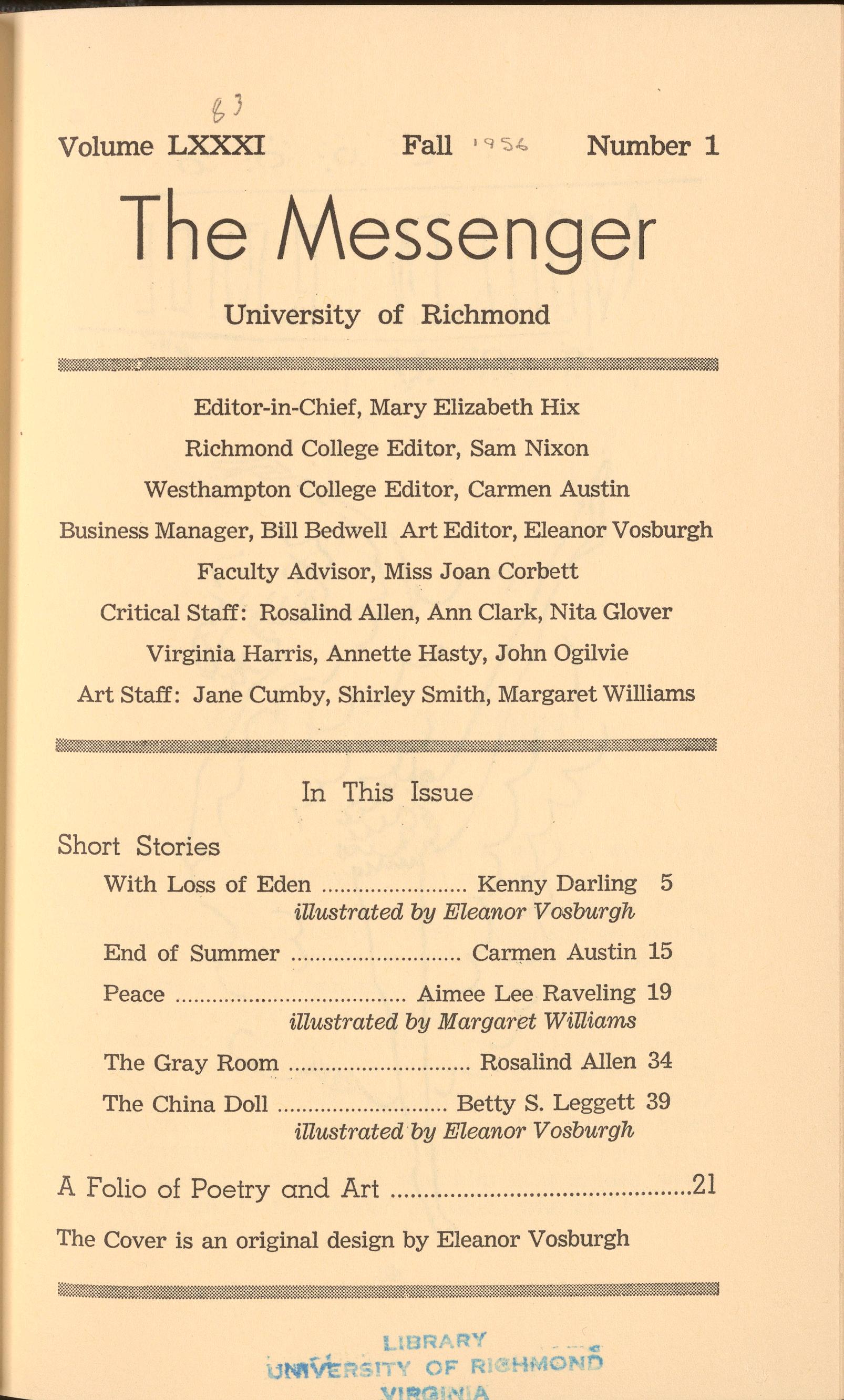
Short Stories
With Loss of Eden ....... ................. Kenny Darling 5 illustrated by Eleanor V osllurgh
End of Summer ............................ Ca:rrp.en Austin 15
Peace ...................................... Aimee Lee Raveling 19 illustrated by Margaret Williams
The Gray Room .............................. Rosalind Allen 34
The China Doll ........... .... Betty S. Leggett 39 illustrated by Eleanor Vosburgh A Folio of Poetry and Art ..............................................21
The Cover is an original design by Eleanor Vosburgh
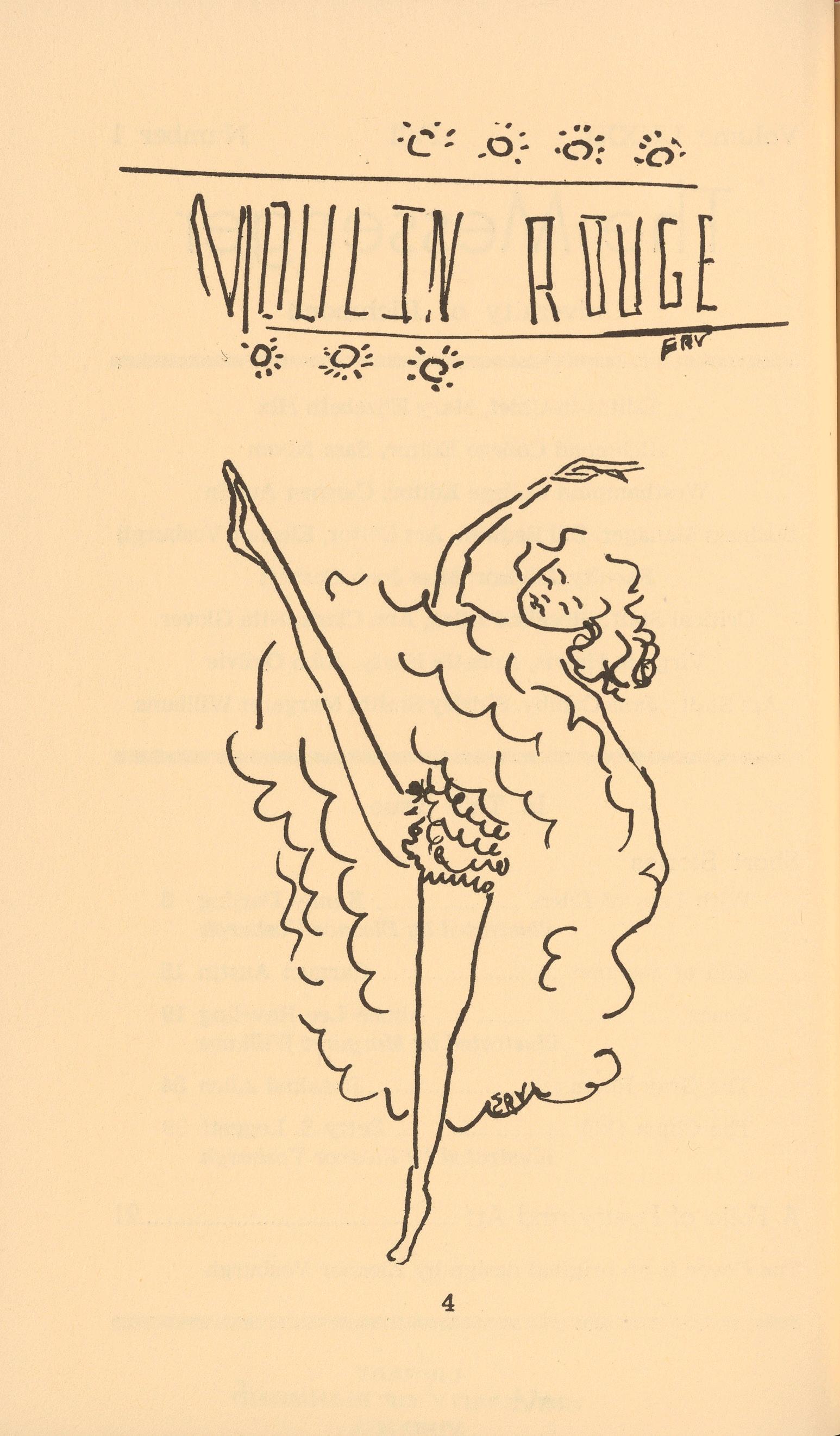
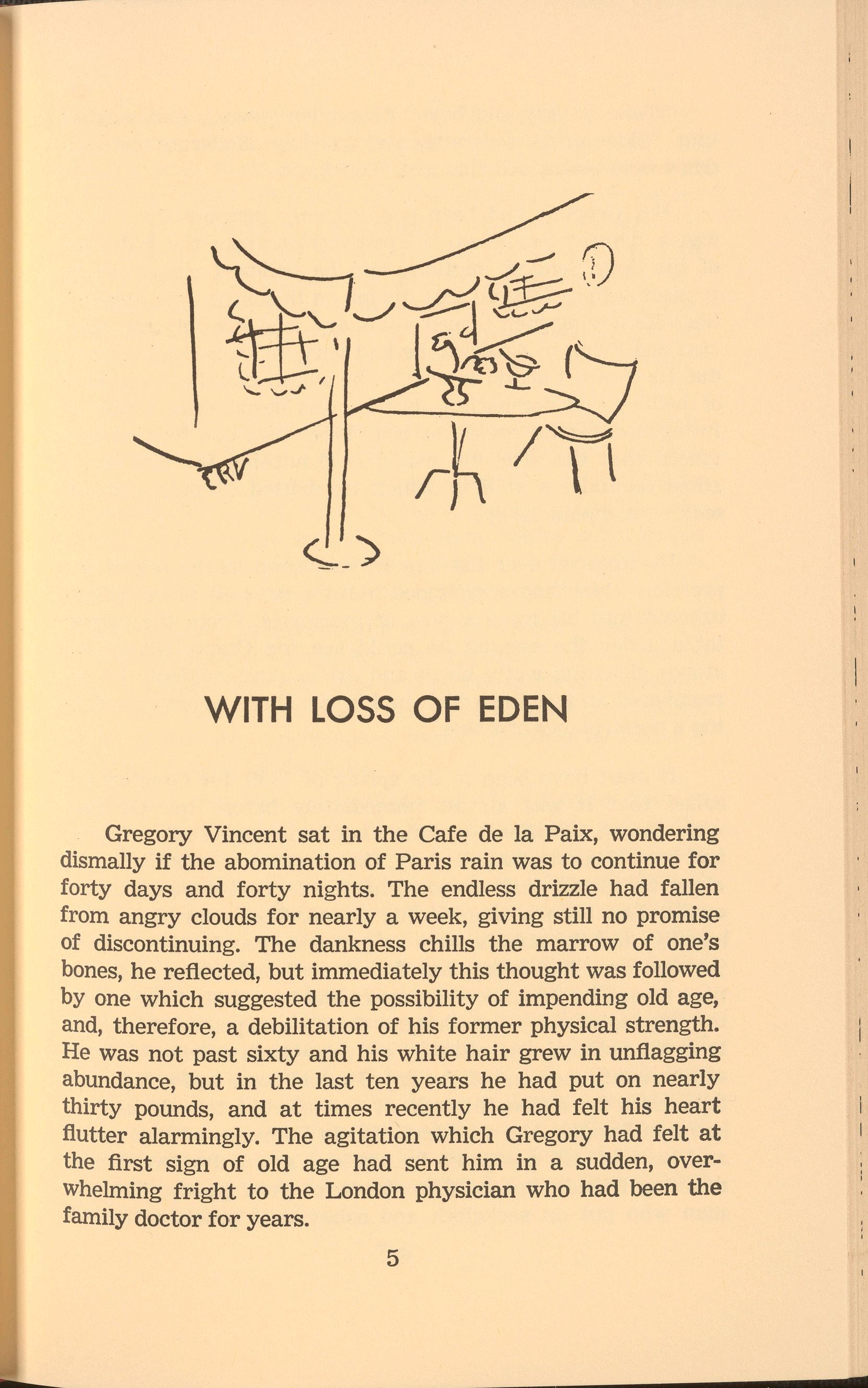
Gregory Vincent sat in the Cafe de la Paix, wondering dismally if the abomination of Paris rain was to continue for forty days and forty nights. The endless drizzle had fallen from angry clouds for nearly a week, giving still no promise of discontinuing. The dankness chills the marrow of one's bones, he reflected, but immediately this thought was followed by one which suggested the possibility of impending old age, and, therefore, a debilitation of his former physical strength. He was not past sixty and his white hair grew in unflagging abundance, but in the last ten years he had put on nearly thirty pounds, and at times recently he had felt his heart flutter alarmingly. The agitation which Gregory had felt at the first sign of old age had sent him in a sudden, overwhelming fright to the London physician who had been the family doctor for years.

"Take it easy, old boy." Alexander Newton had soothed him. "Slow on the cigarettes and whiskey. Moderate exercise, don't take stairs. All that rot. You know."
But Gregory had been pacified only temporarily, for he was a more-or-less staunch Presbyterian from the influence of his dour Scottish mother, and he believed rigorously in predestination. Assured that his job on this earth was finished, his wife having died fifteen years ago, and his only son married and living in America, he had very little else to do except die. He was not afraid of death-he simply could not conceive of hellfire and damnation-but he was desperately afraid of losing life, for he could not bear loneliness, and he was convinced that the after-life would hold nothing for him but a silent solitude, a void in which he drifted aimlessly about, seeking companionship.
He lingered over his dinner, enveloped in the fog of depression which had surrounded him for days-a gloom which ushered into his mind a host of memories. From the corner table under the awning he could see the Opera House, its stones gleaming wetly black and green. And suddenly he remembered an evening which had begun there, years ago, during a performance of Thais.
It must have been in the spring of 1939, for Gregory recalled that it was almost immediately before the German army began its offensive which later included Paris. France had been a burst of April glory, the chestnut trees still flamed along the Seine, and Gregory, having forty-five years to his credit, had been a man in his prime. The river flowed as happily, and the streets were as gay with people as ever, but the fast pace had been even then forced and unreal, its runners tensed for trouble. The papers had been full of the crisis, the impending war, and Gregory finally escaped to the opera to avoid political and military conversations which screamed at him every moment of the day. He had come to Paris in the first place to relieve himself of the morbid tone struck at home in London. His wife had died in February of that year, and he was still overcome by anxious sympathy from wellmeaning friends, but he felt a show of grief gaudy, like the man who put on sackcloth and ashes as a proclamation of
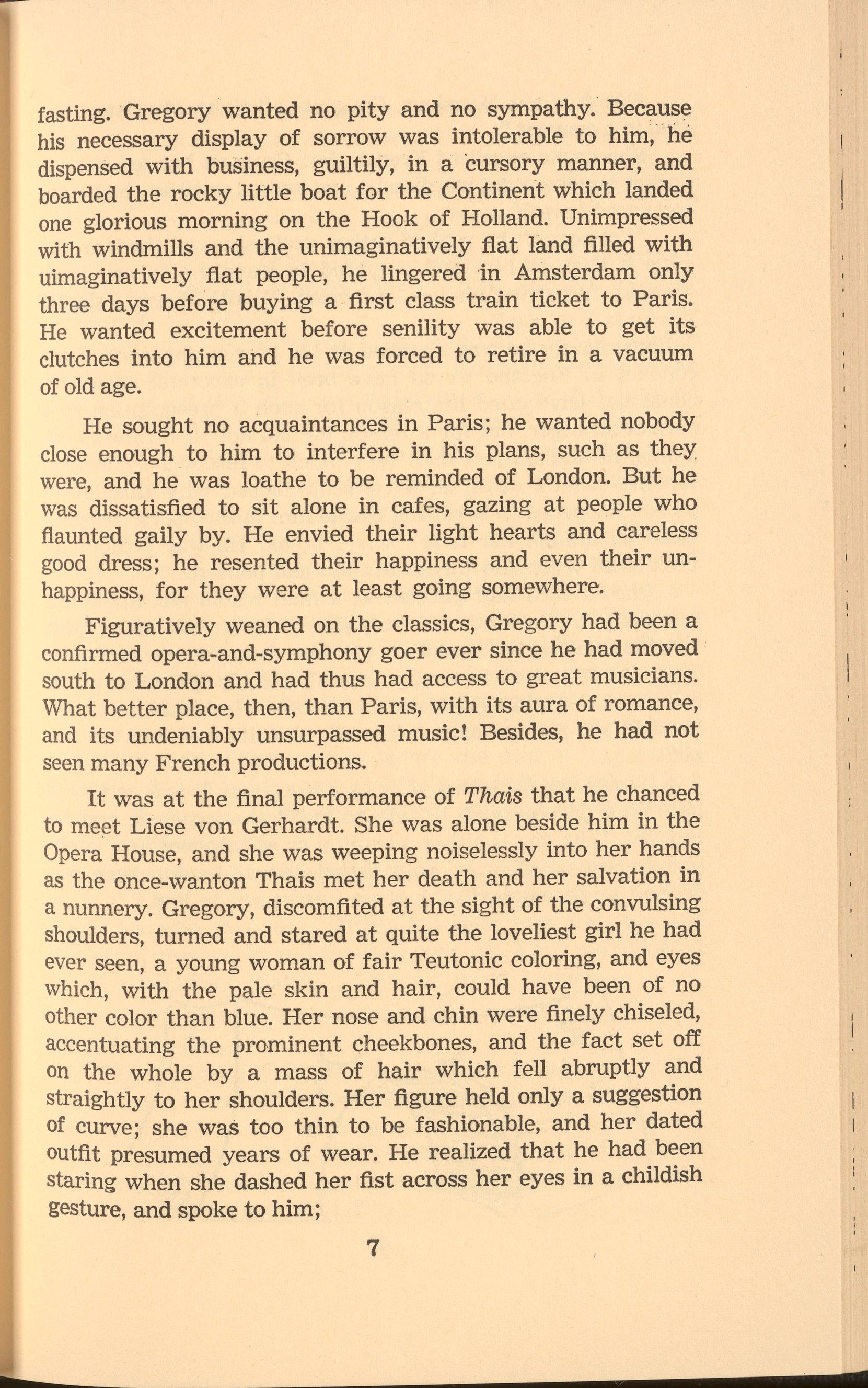
fasting. Gregory wanted no pity and no sympathy. Because his necessary display of sorrow was intolerable to him, · he dispensed with business, guiltily, in a cursory manner, and boarded the rocky little boat for the Continent which landed one glorious morning on the Hook of Holland. Unimpressed with windmills and the unimaginatively flat land filled with uimaginatively flat people, he lingered in Amsterdam only three days before buying a first class train ticket to Paris. He wanted excitement before senility was able to get its clutches into him and he was forced to retire in a vacuum of old age.
He sought no acquaintances in Paris; he wanted nobody close enough to him to interfere in his plans, such as they were, and he was loathe to be reminded of London. But he was dissatisfied to sit alone in cafes, gazing at people who flaunted gaily by. He envied their light hearts and careless good dress; he resented their happiness and even their unhappiness, for they were at least going somewhere.
Figuratively weaned on the classics, Gregory had been a confirmed opera-and-symphony goer ever since he had moved south to London and had thus had access to great musicians. What better place, then, than Paris, with its aura of romance, and its undeniably unsurpassed music! Besides, he had not seen many French productions.
It was at the final performance of Thais that he chanced to meet Liese von Gerhardt. She was alone beside him in the Opera House, and she was weeping noiselessly into her hands as the once-wanton Thais met her death and her salvation in a nunnery. Gregory, discomfited at the sight of the convulsing shoulders, turned and stared at quite the loveliest girl he had ever seen, a young woman of fair Teutonic coloring, and eyes which, with the pale skin and hair, could have been of no other color than blue. Her nose and chin were finely chiseled, accentuating the prominent cheekbones, and the fact set off on the whole by a mass of hair which fell abruptly and straightly to her shoulders. Her figure held only a suggestion of curve; she was too thin to be fashionable, and her dated outfit presumed years of wear. He realized that he had been staring when she dashed her fist across her eyes in a childish gesture, and spoke to him;

"Forgive me, Monsieur. I'm quite all right. My sister, too, died in a convent."
She spoke excellent French, but Gregory handed her his pocket handkerchief wordlessly, and waited until she had quite composed herself.
"I'm sorry," he replied rather uselessly, and then, as she gave it back to him and prepared to leave, he sprang from his seat, forgetting his hat, and cried, "Wait! Please, I should like to talk to you."
Immediately he was appalled at his brazen approach. Such conduct in England would have been in execrable taste. He could not have cited his reason for such a presumption to a perfect stranger, but for a reason he had not then time to examine, he wished just then very much to discover the reason for the sister's death in a convent, indeed why this lovely person happened to be sitting beside him in the opera, weeping alone as though her heart would break. He was profoundly astonished when she turned around and paused.
She in turn had glanced at a man whom she knew immediately to be kind. He had, she thought, too many pain wrinkles around his eyes for a person whom she guessed to be less than fifty. He was neatly dressed, and his eyes were warm and black, as midnight black as his hair. He looked as lonely as she felt, and perhaps, after all, she did owe him an explanation.
"You have forgotten your hat, Monsieur. It is a very nice hat. Why do you wish to talk to me?" she inquired, and he thought, Why she is either a wanton or as innocent as a lamb, for she appeared in no way astonished at having been addressed so peremptorily by a man unknown to her.

"Please", he began rather awkwardly. "I should like very much to make your acquaintance. Will you join me across the street for a liqueur? My name is Gregory Vincent." He cursed himself for his clumsiness, He sounded like a University chap without an engagement for the evening.
She ducked her head, mumbled almost inaudible words of agreement, and he thought, She's a fine actress. Perhaps this is exactly what I need.
Their first conversation still spun in his brain after fifteen years with a startling clarity. He discovered that she was not an actress, that she was German, and that she had left her home because she could no longer bear living with parents who believed in and supported the Nazi regime.
"We are not all Nazi, you know," she looked seriously at him. "Neither my sister nor I believed in the revolution of the world, there were too many cruel and unjust measures which were part of the plan. Sadly enough, it is the youth which they want most. We are the young and the strong, we can be of much benefit to them in the future. My parents are particularly violent in support of this thing. They made life intolerable for us; they killed Else, she was my sister, as surely as if they had taken a gun and shot her through the head. She left our home and went with the sisters, but she was there only a few months before she died of pneumonia. I loved her-I loved her so much!" The words rushed out in a torrent of passion. "She was the only thing in my life which was all good and clean ....
"After that I could not look at my mother and father without terrible accusations springing from me. How I hated them! I loathe that man, Hitler! I despise him, for he would be God of this world and the next, too. Ah, I am nearly eaten up with hate, and that is a very bad thing, I know."
And so, even I cannot escape the war for long, Gregory thought briefly.
She continued sadly. "If war were to break out here, I should have to return to Germany. We Germans are close to our families. I would have to go back and try to help my mother and father. Is it not ironical, Gregory, that I should feel the most boundless loyalty toward the two people in the world whom I can least abide?"
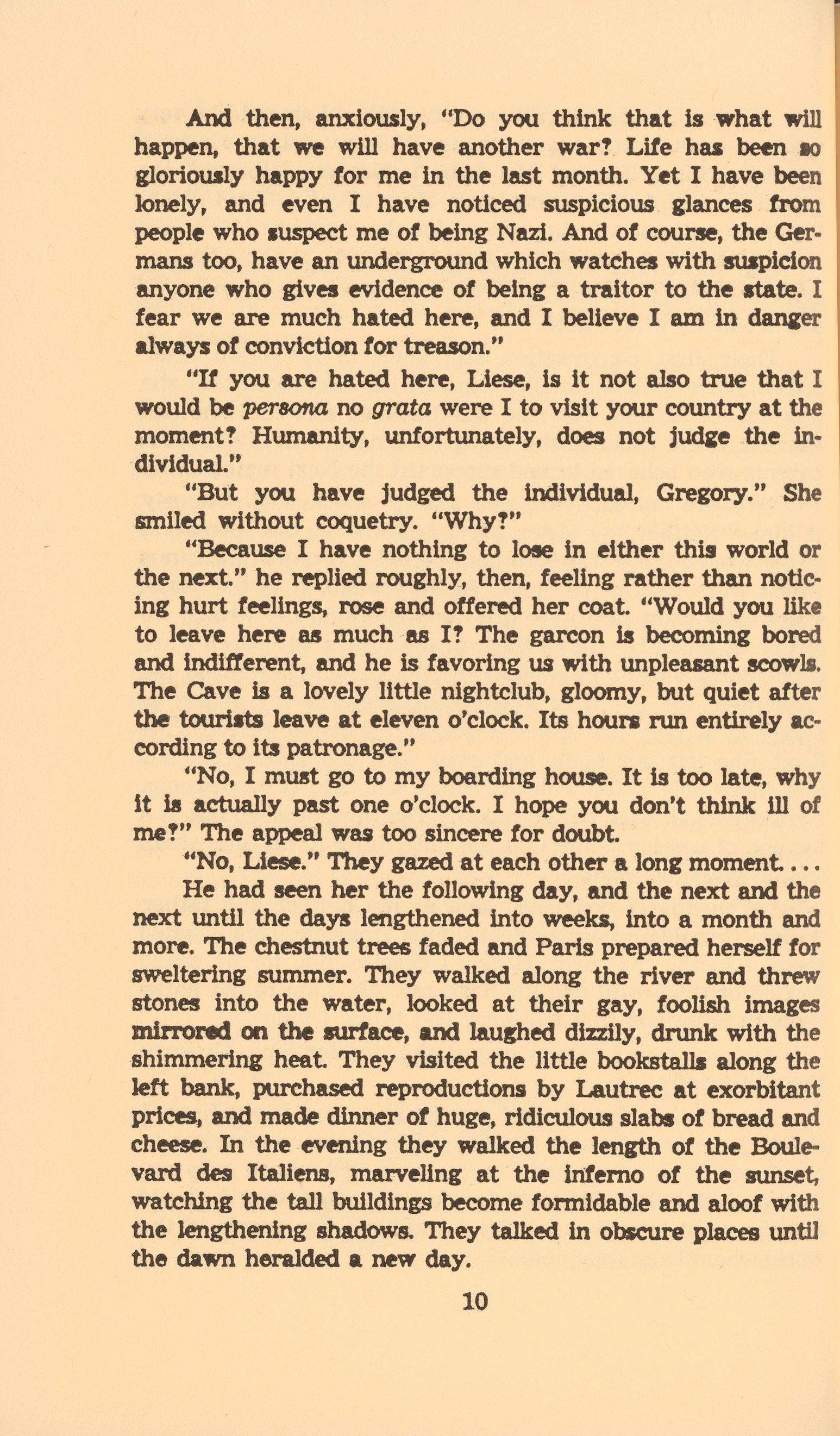
And then, anxiously, "Do you think that is what will happen, that we will have another war! Lite has been 10 gloriously happy for me in the last month. Yet I have bee n lonely, and even I have noticed suspicious glances from people who suspect me of being Nazi. And of course, the Germans too, have an underground which watches with suspici on anyone who gives evidence of being a traitor to the state. I fear we are much hated here, and I believe I am in d~ er always of conviction for treason."
"If you are hated here, Liese, ls it not also true that I would be persona no grata were I to visit your country at th e moment! Hwnanity, unfortunately, does not judie the individual."
"But you have judged the individual, Gregory." Sh e smiled without coquetry. "Why!"
"Because I have nothing to 109e in either this world or the next." he replied roughly, then, feeling rather than noti cing hurt feelings, rose and offered her coat. "Would you like to leave here as much as I! The garcon is becoming bored and indifferent, and he is favoring us with unpleasant scowls. The Cave ls a lovely little nightclub, gloomy, but quiet afte r the tourists leave at eleven o'clock. Its houn run entirely according to it, patronage."
"No, I must go to my boarding house. It is too late, wh y lt is actually past one o'clock. I hope you don't think ill of me!" The appeal was too sincere for doubt.
"No, Liese." They gazed at each other a long moment. .. . He had seen her the following day, and the next and th e next until the days lengthened into weeks, into a month and more. The chestnut trees faded and Paris prepared herself for sweltering summer. They walked along the river and threw stones into the water, looked at their gay, foolish imag es mirrored on the surface, and laughed dizzily, drunk with th e shimmering heat. They visited the little bookstalls along th e left bank, purchased reproductions by La.utrec at exorbitan t pri~ and made dinner of huge, ridiculous slabs of bread an d cheese. In the evening they walked the length of the Boulevard des Italiens, marveling at the lntemo of the sunse t, watching the tall buildings become formidable and aloof wi th the lengthening shadows. They talked in obscure places un til the dawn heralded a new day.
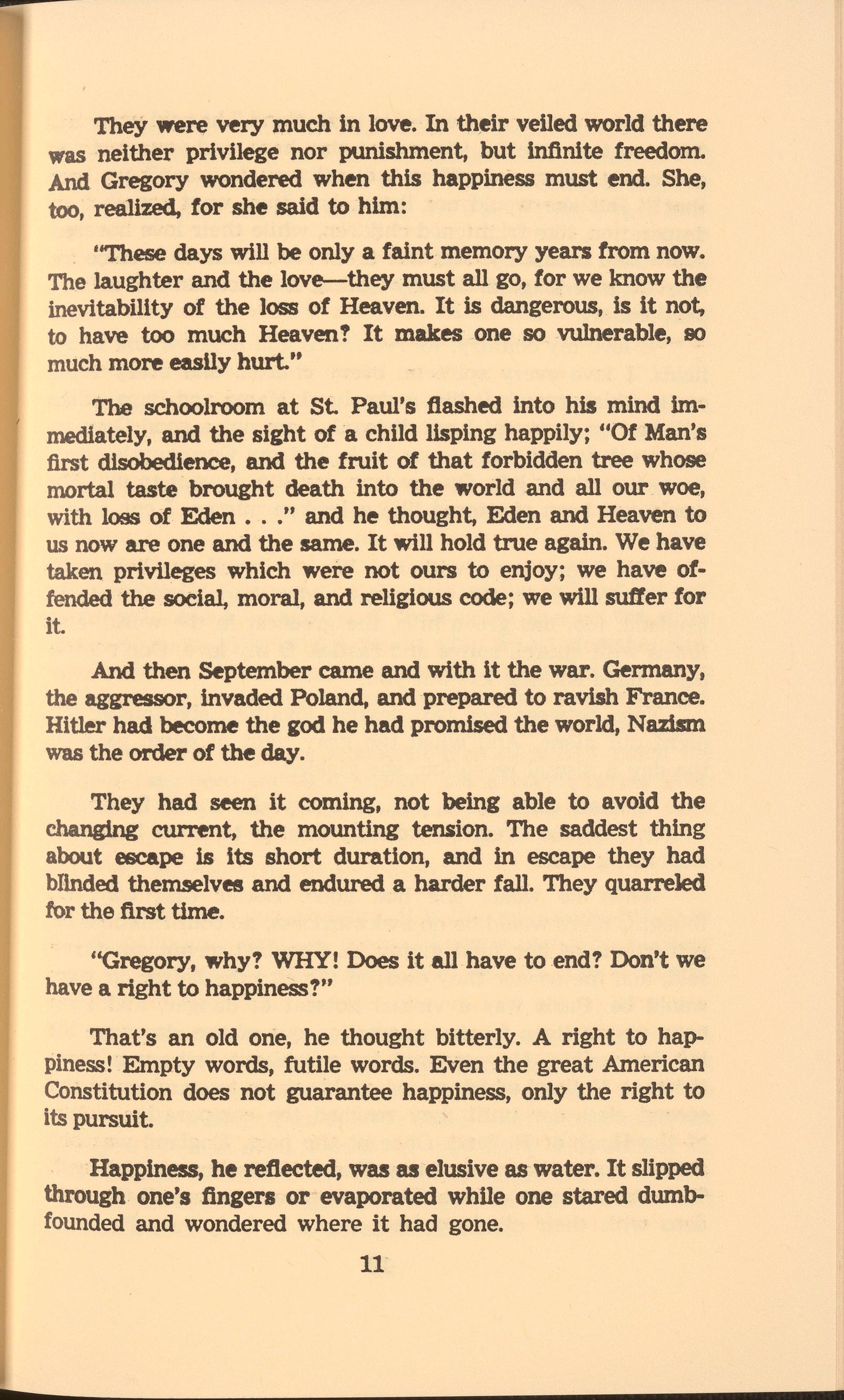
They were very much in love. In th,ir veiled world there was neither privilege nor punishment, but infinite freedom. And Gregory wondered when this happiness must end. She, too, realized, for she said to him:
''These days will be only a faint memory years from now. The laughter and the love-they must all go, for we know the inevitability of the loss of Heaven. It is dangerous, is it not, to have too much Heaven! It makes one so vulnerable, so much more easily hurt."
The schoolroom at St. Paul's flashed into his mind immediately, and the sight of a child lisping happily; .,Of Man's first disobedience, and the fruit of that forbidden tree whose mortal taste brought death into the world and all our woe, with loss of Eden • . ." and he thought, Eden and Heaven to us now are one and the same. It will hold true again. We have tak en privileges which were not ours to enjoy; we have offended the social, moral, and religious code; we will suffer for it
And then September came and with it the war . Germany, the agJireSS()r,invaded Poland. and prepared to ravish France. Hitler had become the god he had promised the world, Nazism wasthe order of the day.
They had seen it coming, not being able to avoid the chang1ng current, the mounting temion. The saddest thing about escape is its short duration, and in escape they had blln ded themselves and endured a harder fall. They quarreled for the first time.
' 'Gregory, why? WHY! Does it all have to end? Don't we have a right to happiness?"
That's an old one, he thought bitterly. A right to happiness! Empty words, futile words. Even the great American Constitution does not guarantee happiness, only the right to its pursuit.
Happiness, he reflected, was as elusive as water. It slipped thro ugh one's fingers or evaporated while one stared dumbfounded and wondered where it had gone.
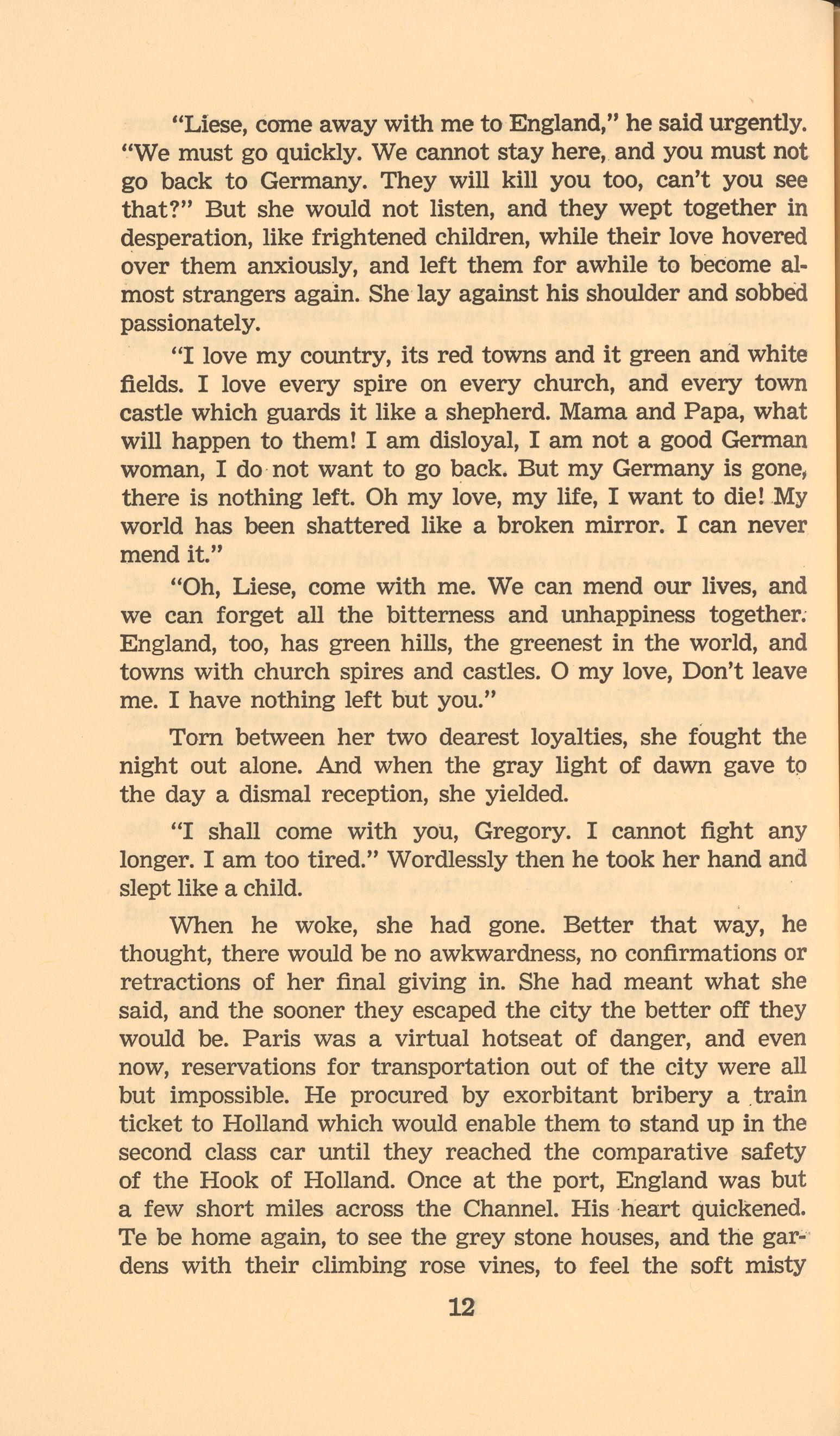
"Liese, come away with me to England," he said urgently. "We must go quickly. We cannot stay here, and you must not go back to Germany. They will kill you too, can't you see that?" But she would not listen, and they wept together in desperation, like frightened children, while their love hovered over them anxiously, and left them for awhile to become almost strangers again. She lay against his shoulder and sobbed passionately.
"I love my country, its red towns and it green and white fields. I love every spire on every church, and every town castle which guards it like a shepherd. Mama and Papa, what will happen to them! I am disloyal, I am not a good German woman, I do ·not want to go back. But my Germany is gone, there is nothing left. Oh my love, my life, I want to die! .My world has been shattered like a broken mirror. I can never mend it."
"Oh, Liese, come with me. We can mend our lives, and we can forget all the bitterness and unhappiness together~ England, too, has green hills, the greenest in the world, and towns with church spires and castles. 0 my love, Don't leave me. I have nothing left but you."
Torn between her two dearest loyalties, she fought the night out alone. And when the gray light of dawn gave to the day a dismal reception, she yielded.
"I shall come with you, Gregory. I cannot fight any longer. I am too tired." Wordlessly then he took her hand and slept like a child.
When he woke, she had gone. Better that way, he thought, there would be no awkwardness, no confirmations or retractions of her final giving in. She had meant what she said, and the sooner they escaped the city the better off they would be. Paris was a virtual hotseat of danger, and even now, reservations for transportation out of the city were all but impossible. He procured by exorbitant bribery a train ticket to Holland which would enable them to stand up in the second class car until they reached the comparative safety of the Hook of Holland. Once at the port, England was but a few short miles across the Channel. His heart quickened. Te be home again, to see the grey stone houses, and the gar.;.: • dens with their climbing rose vines, to feel the soft misty
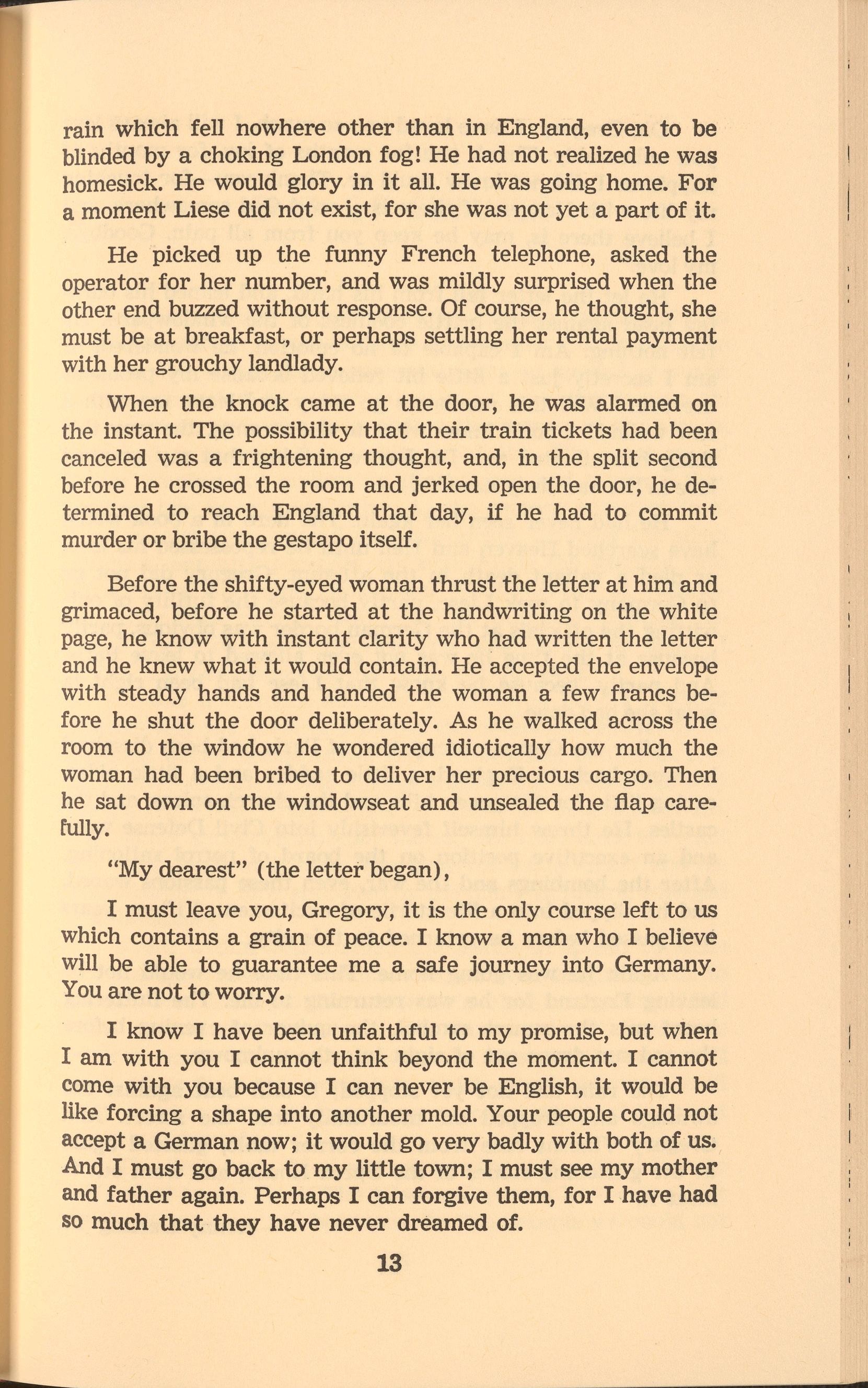
rain which fell nowhere other than in England, even to be blinded by a choking London fog! He had not realized he was homesick. He would glory in it all. He was going home. For a moment Liese did not exist, for she was not yet a part of it.
He picked up the funny French telephone, asked the operator for her number, and was mildly surprised when the other end buzzed without response. Of course, he thought, she must be at breakfast, or perhaps settling her rental payment with her grouchy landlady.
When the knock came at the door, he was alarmed on the instant. The possibility that their train tickets had been canceled was a frightening thought, and, in the split second before he crossed the room and jerked open the door, he determined to reach England that day, if he had to commit murder or bribe the gestapo itself.
Before the shifty-eyed woman thrust the letter at him and grimaced, before he started at the handwriting on the white page, he know with instant clarity who had written the letter and he knew what it would contain. He accepted the envelope with steady hands and handed the woman a few francs before he shut the door deliberately. As he walked across the room to the window he wondered idiotically how much the woman had been bribed to deliver her precious cargo. Then he sat down on the windowseat and unsealed the flap carefully.
"My dearest" (the letter began),
I must leave you, Gregory, it is the only course left to us which contains a grain of peace. I know a man who I believe will be able to guarantee me a safe journey into Germany. You are not to worry.
I know I have been unfaithful to my promise, but when I am with you I cannot think beyond the moment. I cannot come with you because I can never be English, it would be like forcing a shape into another mold. Your people could not accept a German now; it would go very badly with both of us. And I must go back to my little town; I must see my mother and father again. Perhaps I can forgive them, for I have had so much that they have never dreamed of.

Oh, Gregory, I have loved you so much, I will always love you unbearably. Thank you for months of joy, for months of happiness I did not know could be. Thank you-for touching my life with Heaven. If there is a good God somewhere, and I believe there is, may he keep you from all pain. Goodbye, my love."
He let the letter fall from his hand, and leaned his burning head against the brittle coolness of the windowpane. He felt nothing. Am I capable of no emotion, he wondered, or am I secretly just a little bit relieved because my problems are over? Will this numbness go away and leave me with a raw wound? I don't know what to do; strange, the way this thing has affected me. Do I care nothing that my greatest love in life has disappeared? ...
He had never seen her again. The hero in a book would have searched Heaven and Hell until he repossessed his love, or died a valiant death in the attempt. Gregory did not go to Germany to seek Liese, partly because the futility of outwitting the officials at the German border was obvious, partly because at the time he w~ not even allowed to leave Paris. And partly, because he know that Liese had been right in what she had done.
After the German occupation of Paris had been dissolved he went back to England, a little sadder and a little older, caring little for the green hills and the church spires, and the castles. He threw himself feverishly into Civil Defense work and an executive position on the board of petrol rationing. After the bombings and the war, even these passions waned, and he slipped into a life sterile of excitement. Fifteen years had passed before he returned to this city.
Again he was going home. This time he would not be leaving England for he was returning to die. The fluttering heart was the sunset symbol, the quiver of evening before the red sun drops out of sight into the unknown.
The rain had not yet stopped; it still beat against the awnings and dropped off mournfully into the street. And Gregory Vincent rose from the corner table, glanced again at the glistening stones of the Opera House, and went out to meet it.
-Kenny Darling '57

The interval of twenty years had changed nothing. Again I sought refuge in the solitude and comfort of the granite rock which stands in monumental form-a symbol of youth -yet possessing the stern qualities of a weatherbeaten old man, strong and wise in guarding the secrets of the sea. In this instant I sense the eternity of all life. The great sea of water reaches out embracing the horizon and together they become one in separate unity. As the retiring sun slips from view a mist rises around me-cautiously, revering the silent stillness. Serenity pervades my soul. Along the winding path of memory my mind encounters the yesterday of youththe memories parade stealthily and tangibly-perhaps because there has been provided no opportunity of flight. I follow the beckoning readily, with painful ease. It was a tortuous summer. In clutched hand I watched protectively my dreams. I feared the chameleon spirits of indecision which lashed them. But in the midst of this torture and bitterness there was always laughter. It offered our only escape from fear. There exists no reality for venerable youth. The sandy shore became our mecca. We tried hard to forget war and death and tears. The time for achievement and accomplishments, long shrouded by the dimly lit future, emerged and beckoned.
From within was kindled the desire to speak; to write the strange feelings of sadness which even laughter fails to banish into oblivion. The calendar's blank stare was filled with one date-September 10th. Our cloak of dignity as seniors would then be donned. Only nine months separated each of us from the world into which we would step-so ill prepared to appreciate happiness; even less prepared to accept sorrow and grief.
The days were filled with swimming and sunbathing-so very vital to our lives. The jokes and stories by the fireplace in the lodge were too boistrous. In this masque we could not
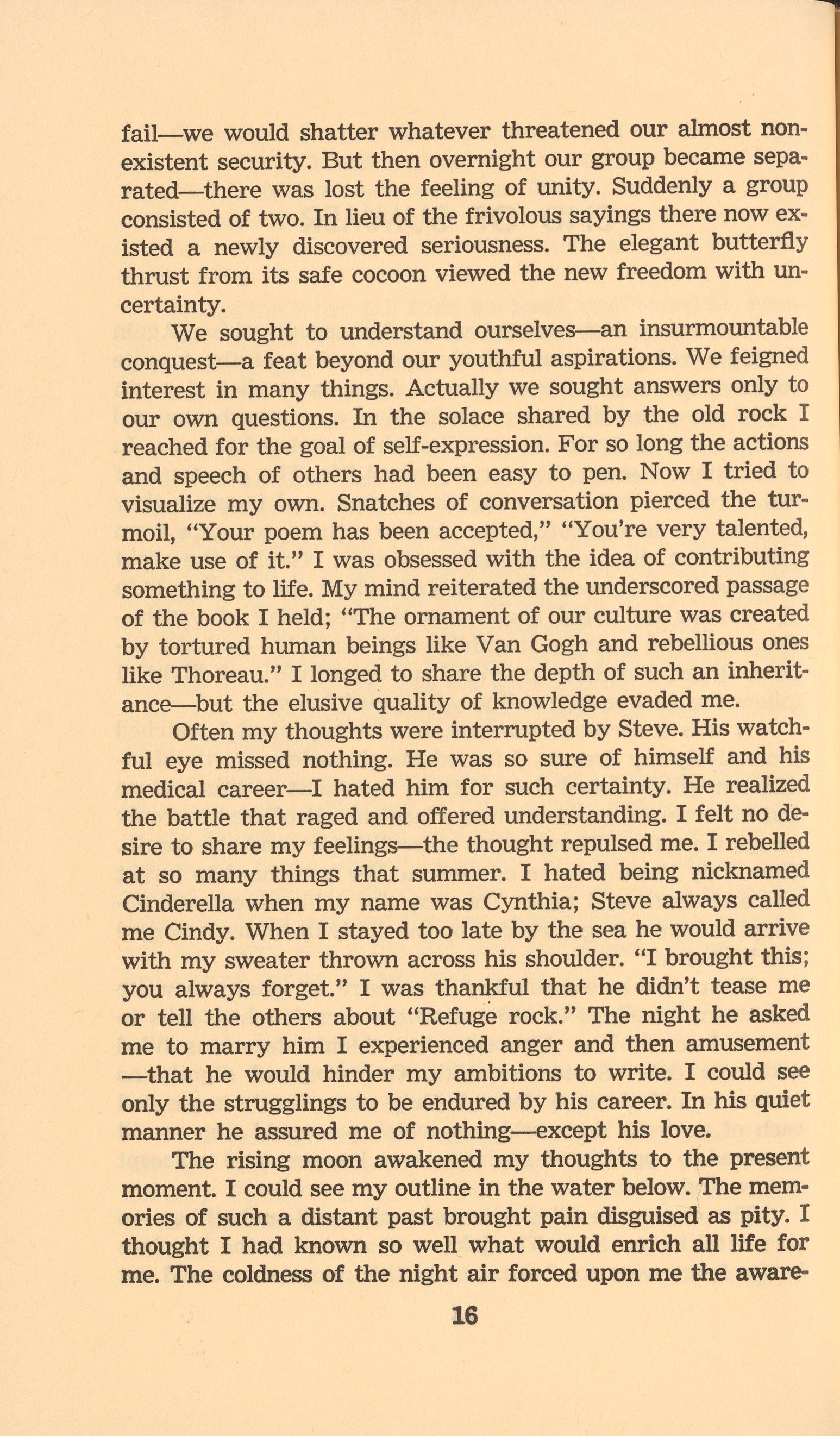
fail-we would shatter whatever threatened our almost nonexistent security. But then overnight our group became separated-there was lost the feeling of unity. Suddenly a group consisted of two. In lieu of the frivolous sayings there now existed a newly discovered seriousness. The elegant butterfly thrust from its safe cocoon viewed the new freedom with uncertainty.
We sought to understand ourselves-an insurmountable conquest-a feat beyond our youthful aspirations. We feigned interest in many things. Actually we sought answers only to our own questions. In the solace shared by the old rock I reached for the goal of self-expression. For so long the actions and speech of others had been easy to pen. Now I tried to visualize my own. Snatches of conversation pierced the turmoil, "Your poem has been accepted," "You're very talented, make use of it." I was obsessed with the idea of contributing something to life. My mind reiterated the underscored passage of the book I held; "The ornament of our culture was created by tortured human beings like Van Gogh and rebellious ones like Thoreau." I longed to share the depth of such an inheritance-but the elusive quality of knowledge evaded me. Often my thoughts were interrupted by Steve. His watchful eye missed nothing. He was so sure of himself and his medical career-I hated him for such certainty. He realized the battle that raged and offered understanding. I felt no desire to share my feelings-the thought repulsed me. I rebelled at so many things that summer. I hated being nicknamed Cinderella when my name was Cynthia; Steve always called me Cindy. When I stayed too late by the sea he would arrive with my sweater thrown across his shoulder. "I brought this; you always forget." I was thankful that he didn't tease me or tell the others about "Refuge rock." The night he asked me to marry him I experienced anger and then amusement -that he would hinder my ambitions to write. I could see only the strugglings to be endured by his career. In his quiet manner he assured me of nothing--except his love. The rising moon awakened my thoughts to the present moment. I could see my outline in the water below. The memories of such a distant past brought pain disguised as pity. I thought I had known so well what would enrich all life for me. The coldness of the night air forced upon me the aware-

ness of physical discomfort. Shivering, I seem to visualize the thin line which separates love and selfishness, loneliness and togetherness. I longed to be 19 again-to erase the errors. As I moved toward the rocky path which led to the shore, a voice broke the silence. "Cindy I brought this. You always forget." I turned swiftly. The night confronted me with it's sterile emptiness-I was still alone. I rebuked my longing heart and imaginative mind. There was no voice; only the echo of greedy waves, lashing harshly against the unyielding granite rock.
Carmen Austin '57
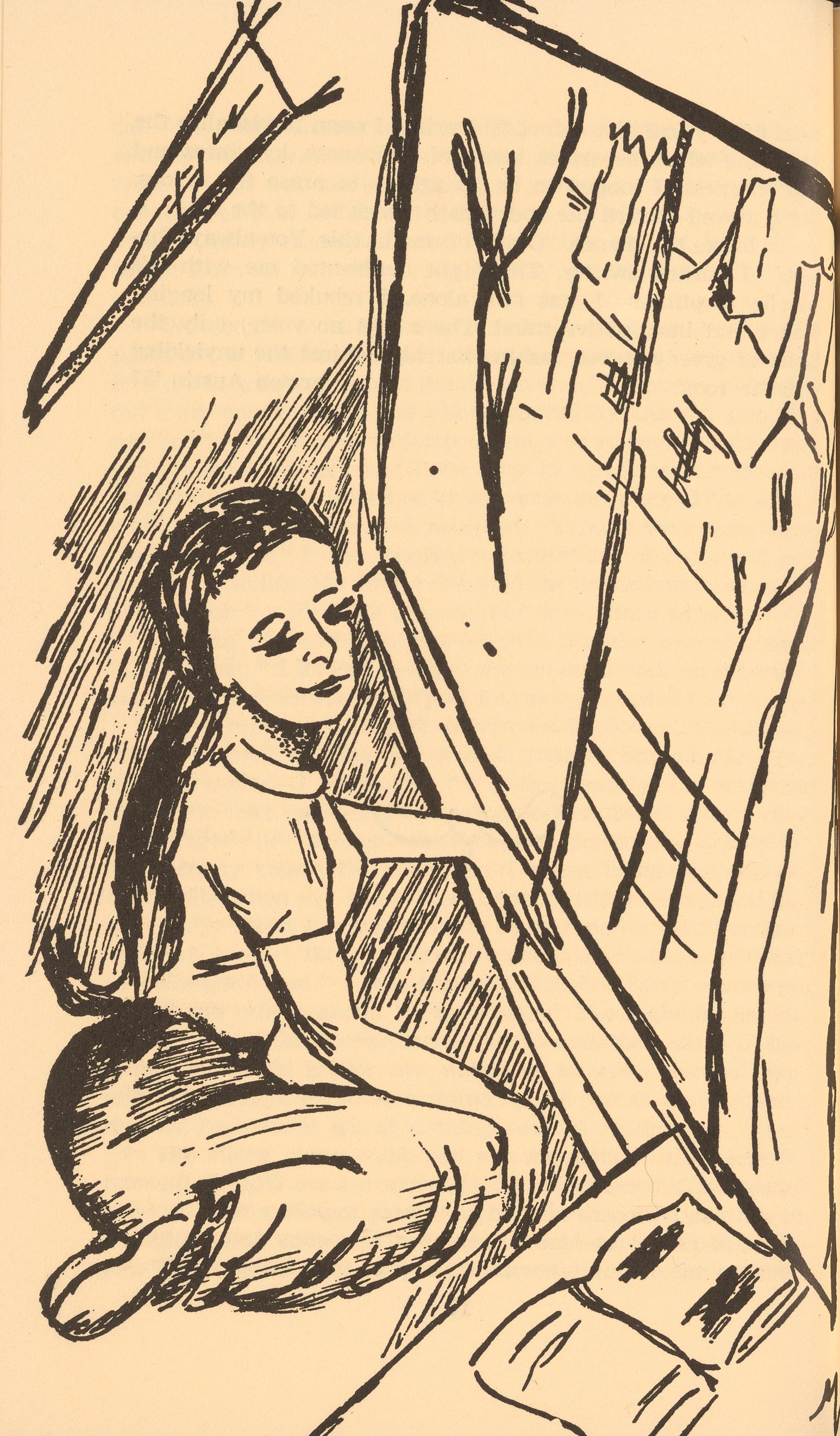

You had to be proud. Peace had learned this so long ago tha t it was hard to remember a time that she had not known it. Sometimes she suspected that this knowledge was already a developed integral of her being at the moment of her birth. Certainly it was as much a part of her as her blue eyes or the long swath of brown hair which she pulled back from her face thro ugh rubber bands to hang straight and unyielding down her back . Of course in reality she knew that her baby self had come equipped with only the usual infant emotions, and that this fierce pride which was the core of her being must have come later, probably just after the divorce.
If she had only told Tim in the beginning-but now he wanted to be a minister. The calendar on her desk was almost covered with neat cross-marks. She had discovered that crossing off the days made them go faster and that had been what she wanted most-to make the days hurry, hurry to graduation and then the wedding. The wedding was to have been at his home in just three weeks and four days. Her own mother could not have afforded to give her a wedding even ifHenry was flying back from Europe for her graduation. She didn't suppose he wanted to really, although he liked her well enough even though he had once termed her a "regular nuisance." But he had paid for most of her expenses aside from the scholarship and her summer earnings and the little her father could afford so he said he "had a stake in her" and, distasteful as this might be to her, she acknowledged tha t it was nevertheless quite true. He called it his Peace Plan, but she forgave him this even though there was so much she could not forgive him, because he had given her th ese four years.
That first September she had not wanted her mother to come with her to the small Southern college she had finally chosen partly because it had a cultural tradition most Northerners respected, and partly because there was something very solid looking in the pictures of beautiful old Gothic buildings
on the bulletins the school sent out. She had been embarrassed, as she had known she would be, at the tea for freshmen and their parents. Her mother looked di:fferent from all of the other mothers-her eyes were too blue and her body too thin and no one else wore her hair piled high in a coronet of thick braids. Peace's room was large and her two roommates lively and she knew that this was better than home. But she clung to her mother and cried and cried until her mother said, "Really, dear, this is nonsense and I have to go," and she told her goodby. When she came back to her room, her roommates had asked her why she looked so pale. It took all the pride in her to laugh lightly and say, "Your beastly Southern sun and I'm hungry" so that they laughed too. They all three lay awake that night and talked on interminably about all the things three girls who have never seen each other before have to say to each other. Peace had lain quite still and straight in her narrow bed until Sue asked about her name. Then she told them that her mother was English and her father Spanish-that they had met and married soon after both reached New York and since she was born of the union between two traditional enemy countries they had seen fit to name her Peace. Peace laughed, "I suppose I'm lucky they didn't name me Armada."
Both of the other girls giggfed. The tall thin dark-eyed girl whose name was Roberta had remarked, "Your father is very nice looking," and Peace had realized with a sense of shock that she meant Henry. Then she had said quietly, "Yes, he is." The other two started to talk about boy friends back home. Peace had never had a boy friend. She quietly went to sleep.
There were many boyfriends for Peace that first year . Northern boys liked her because she could talk about their home and Southern boys were intrigued by her tall good looks and cool smile. Sometimes she looked childishly prim, but she was never shocked by anything.
Peace moved into a single at the end of that first semester. The Dean approved because the girl's grades had not fulfilled the promise of her I. Q. tests and she expected her to do better with less distractions. So the three told everybody that it was because of grades, but the hall and soon the donn
(Continuedon Page 44)
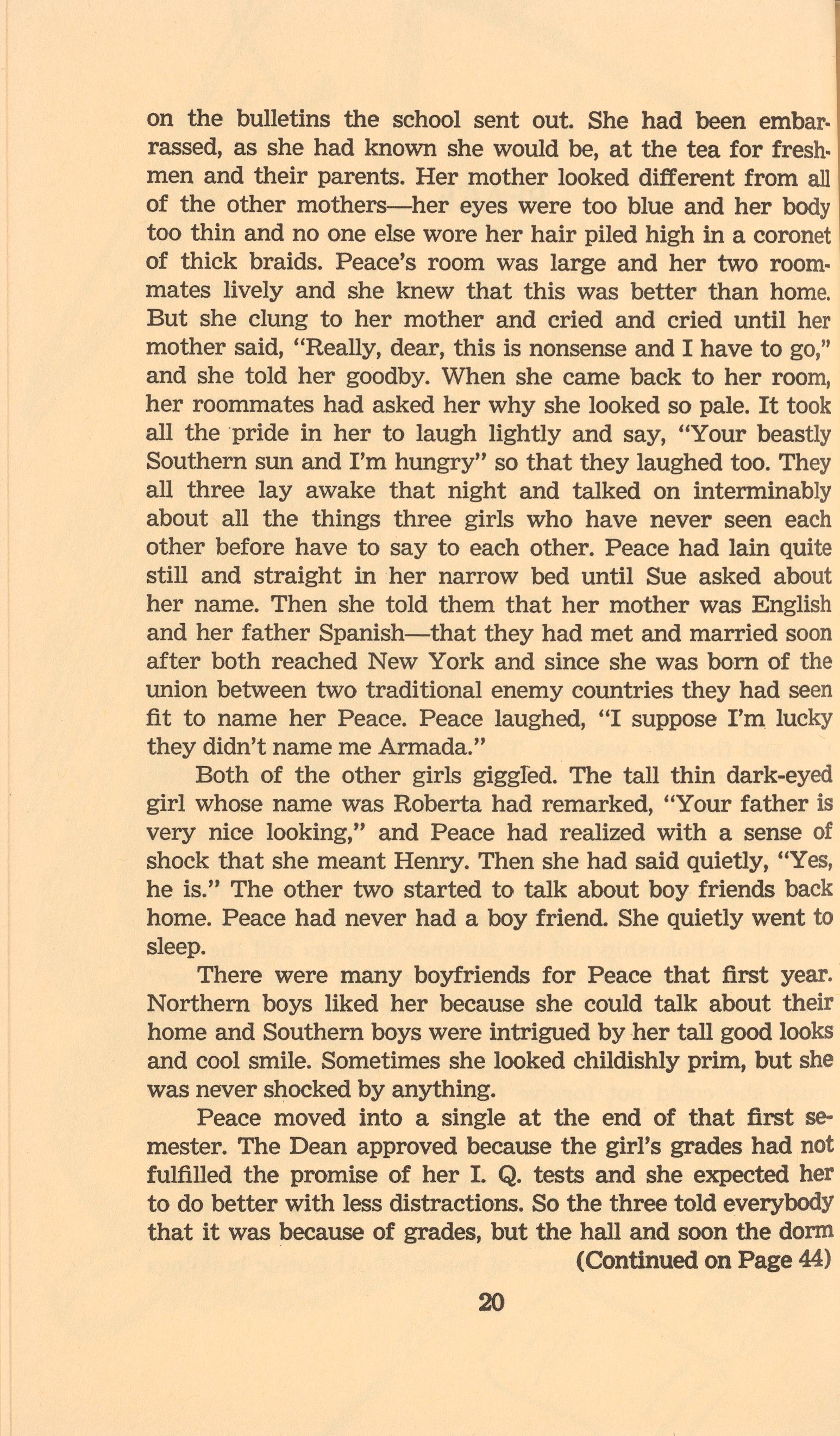
Rosalind Allen
Margaret Logan Ball
Richard C. Brown
Mary Elizabeth Hix
Ann Hunter
Betsy Minor
Sam Nixon
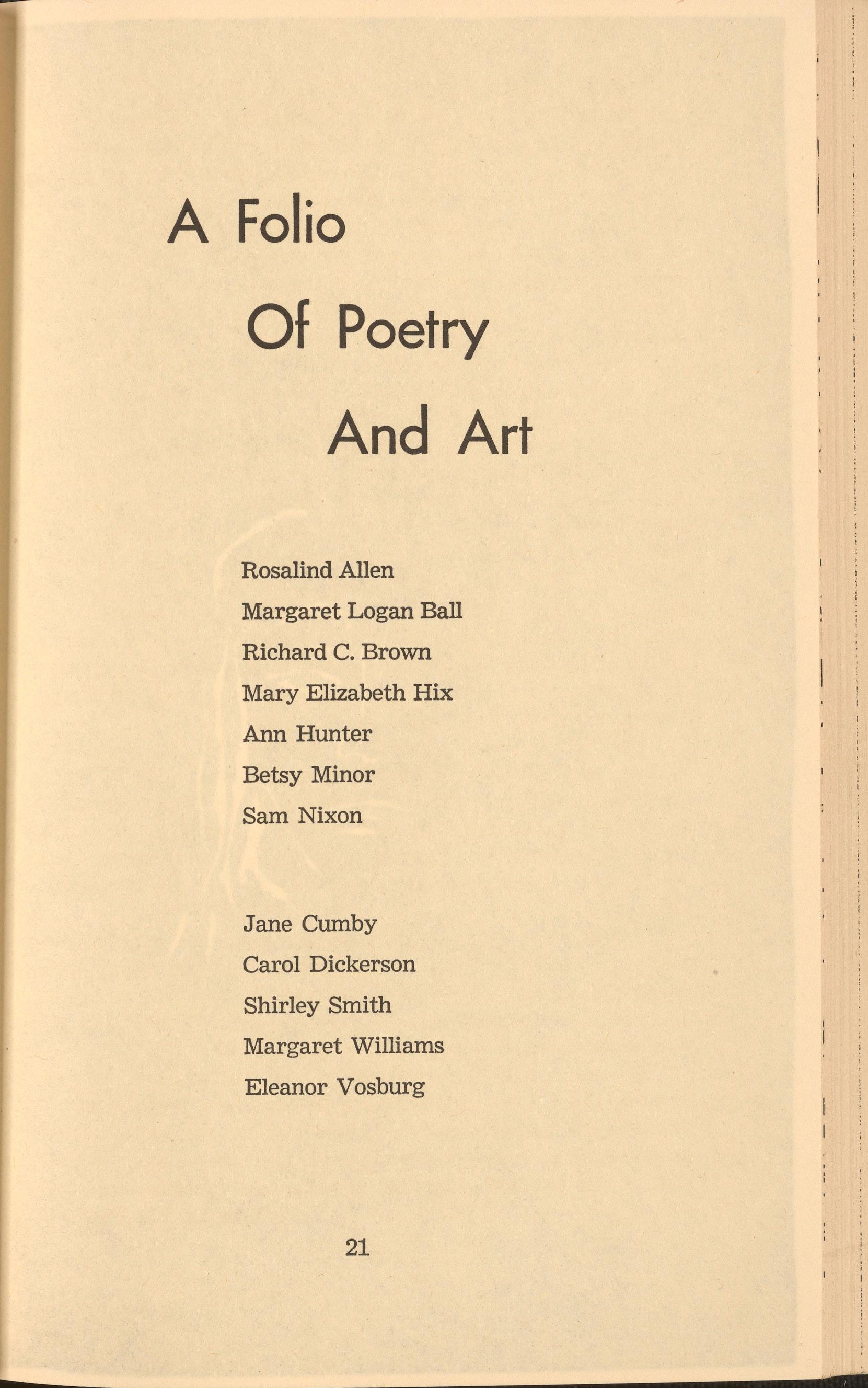
Jane Cumby
Carol Dickerson
Shirley Smith
Margaret Williams
Eleanor Vosburg

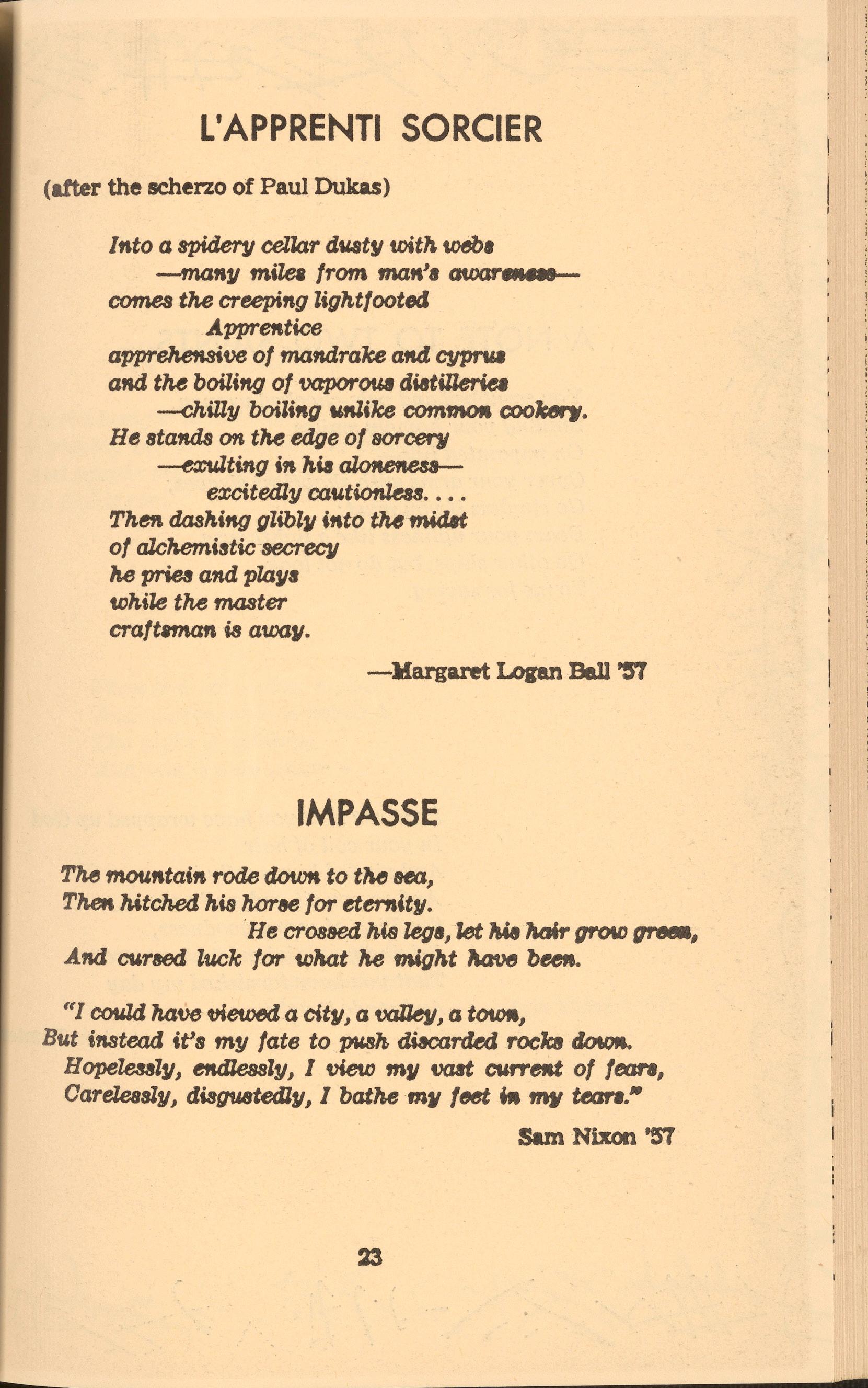
(after the scherzo of Paul Dukas)
lflto a spidery cel'lar d"8ty with web, -ma,sy milea from mats'• atoarM.,. comes the creeping lightf oot«J Appre,stice apprehemive of mandrake atld cwru, atld the boiling of ooporou, diatUleriea -chilly boilitsg "fllike commo11cookerr. H~ stands on the edge of BOrcer,J ~ting'" hil excitedly cautionlesa . .••
Thtm dashing glibl11it1to tM-midet of alchemistic secrecy heprie.,andp'laya while the master craft,mcm i8 away.
-Margaret Logan Ball '5'7
TM moutstaiflrode down to the sea, Thell hitched his hcrae for etem,ty.
·He crossed h'8 lega, Jet M, 1'mrgrotD gr-ea, And curaed luck for what 1r.emight 1lave bee,t.
"I could have viewed a dt11, a~, a tOIOtl, But instead it's my fate to push diacarded rocka dolotl. Hopele3aly, etsdle8Bly, I~ mi, mat CUfTmlt of fears, Carelessly, dis{lt48tedltl, I bathe mr ftJet"' m, t«in.•
Sam Nixon '3"f
I stood tonight in the rain, Watching the world revolve in puddles, And caught my breath with joy
To fi nd it real.
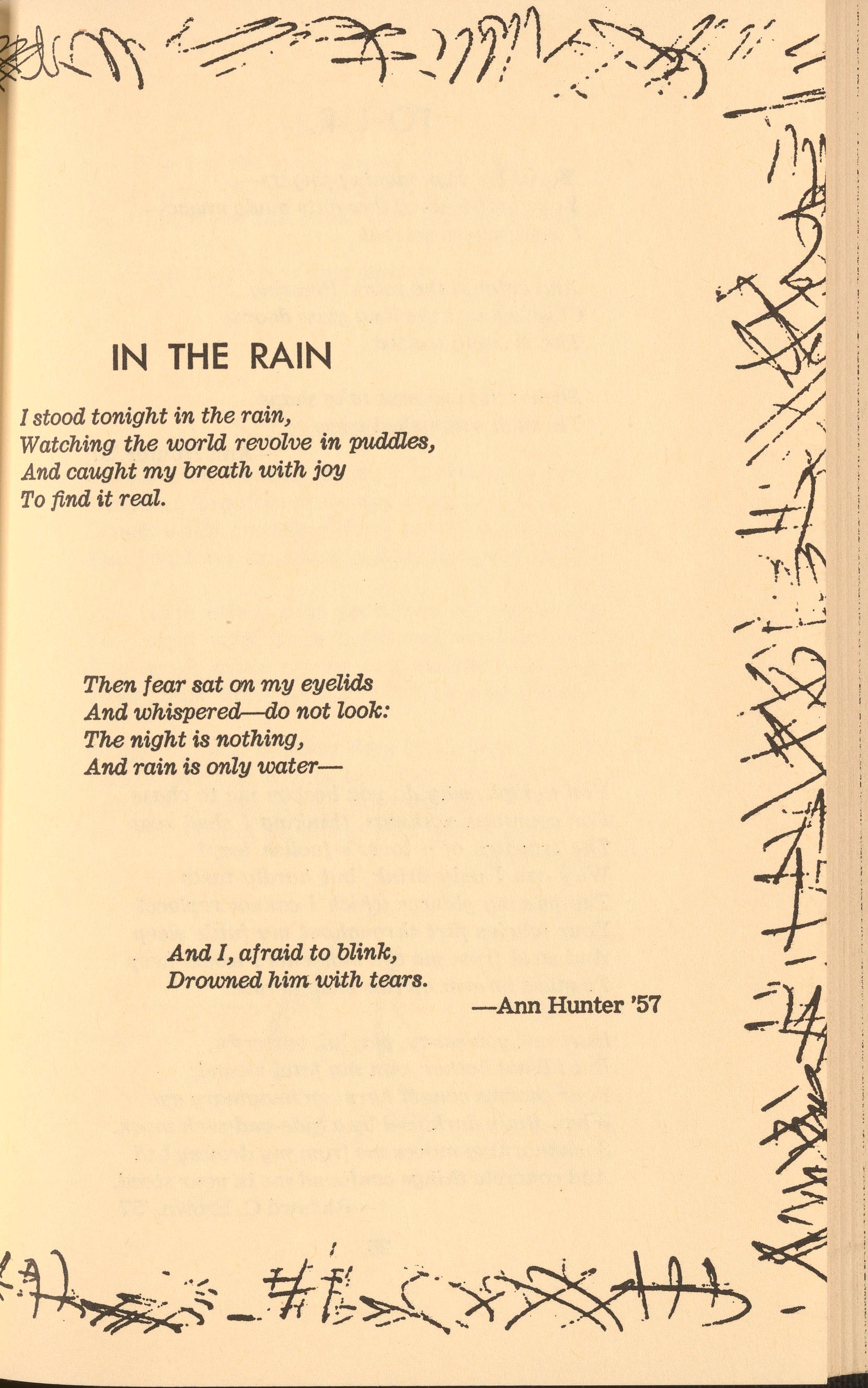
Then fear sat on my eyelids And whispered-do not look: The night is nothing, And rain is only waterAnd I, afraid to blink, Drowned him with tears.
Moved by yoor moving fingersYoor half-formed thoughts made musicI came where you sat
And entered the room. Pressing Close against the long glass doors, The evening waited,
Seeing the universe take shape Throogh unfinished eyes.
-Ann
Hunter '57
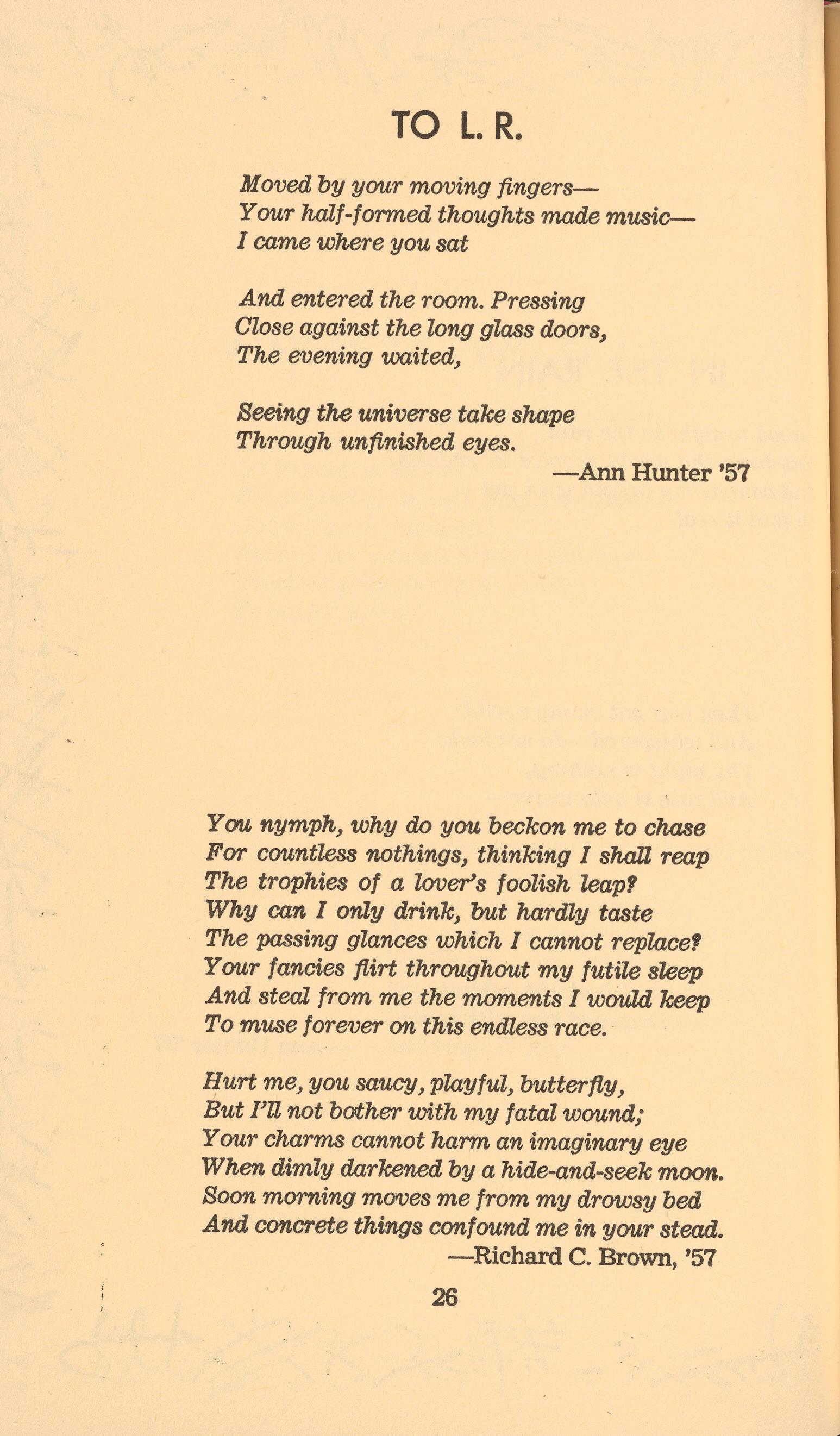
You nymph, why do you beckon me to chase For counfless nothings, thinking I shall reap The trophies of a lover's foolish leap1 Why can I only drink, but hardly taste The passing glances which I cannot replace1 Your fancies flirt throughout my futile sleep And steal from me the moments I would keep To muse forever on this endless race.
Hurt me, you saucy, playful, butterfly, But I'll not bather with my fatal wound; Your charms cannot harm an imaginary eye When dimly darkened by a hide-and-seek moon. Boon morning moves me from my drowsy bed And concrete things confound me in your stead.
-Richard C. Brown, '57
My ears long for the sweet sound of water beating sand. My eyes long for the soft sight of ocean meeting land. My mind longs for the silent calm that comes with evening tide.
There sighing, longing, crying deep inside.
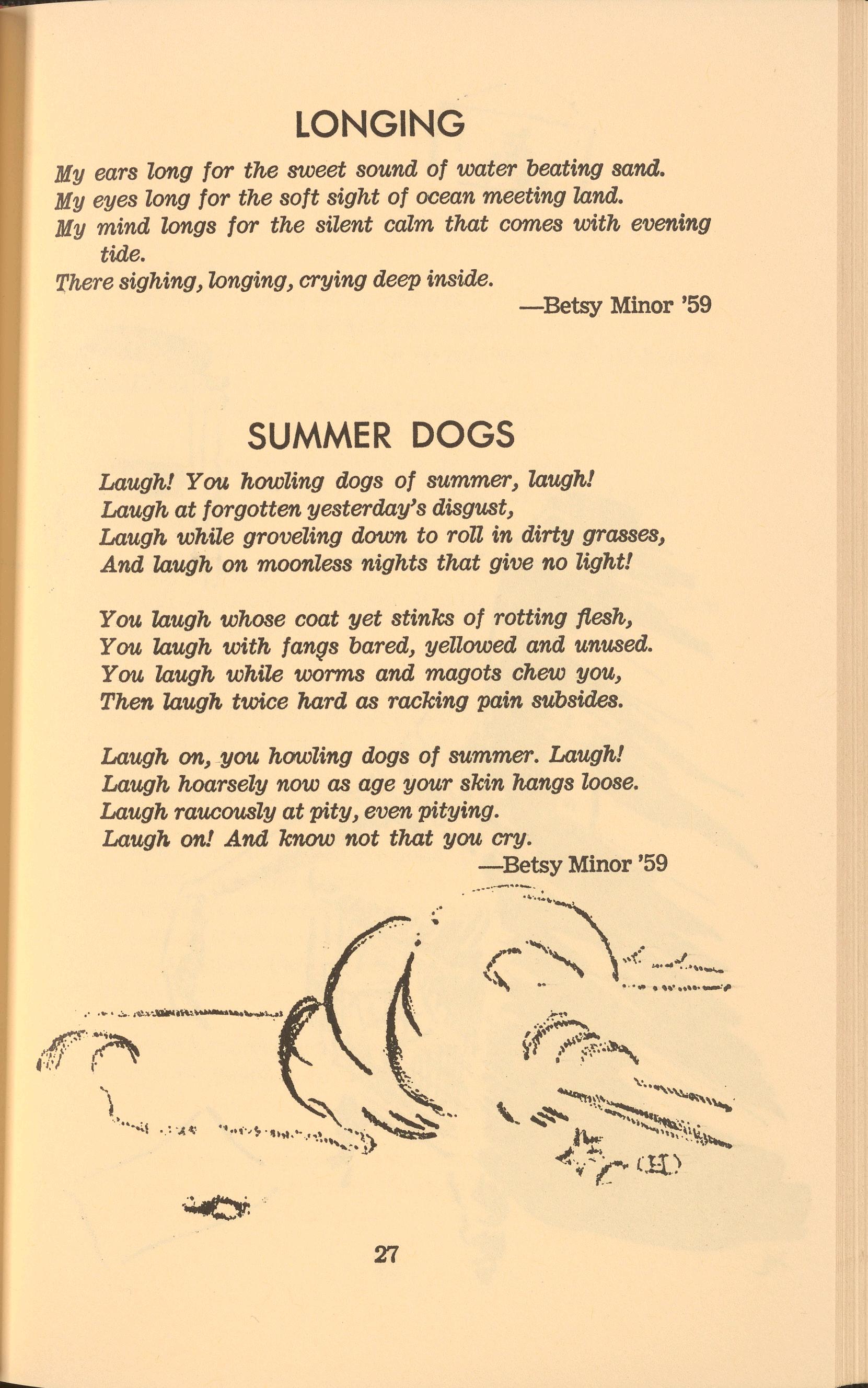
-Betsy Minor '59
Laugh! You howling dogs of summer, laugh! Laugh at forgotten yesterday's disgust, Laugh while groveling down to roll in dirty grasses, And laugh on moonless nights that give no light!
You laugh whose coat yet stinks of rotting flesh, You laugh with fanqs bared, yellowed and unused. You laugh while worms and magots chew you, Then laugh twice hard as racking pain subsides.
Laugh on, you howling dogs of summer. Laugh! Laugh hoarsely now as age your skin hangs loose. Laugh raucously at pity, even pitying. Laugh on! And know not that you cry.
-Betsy Minor '59
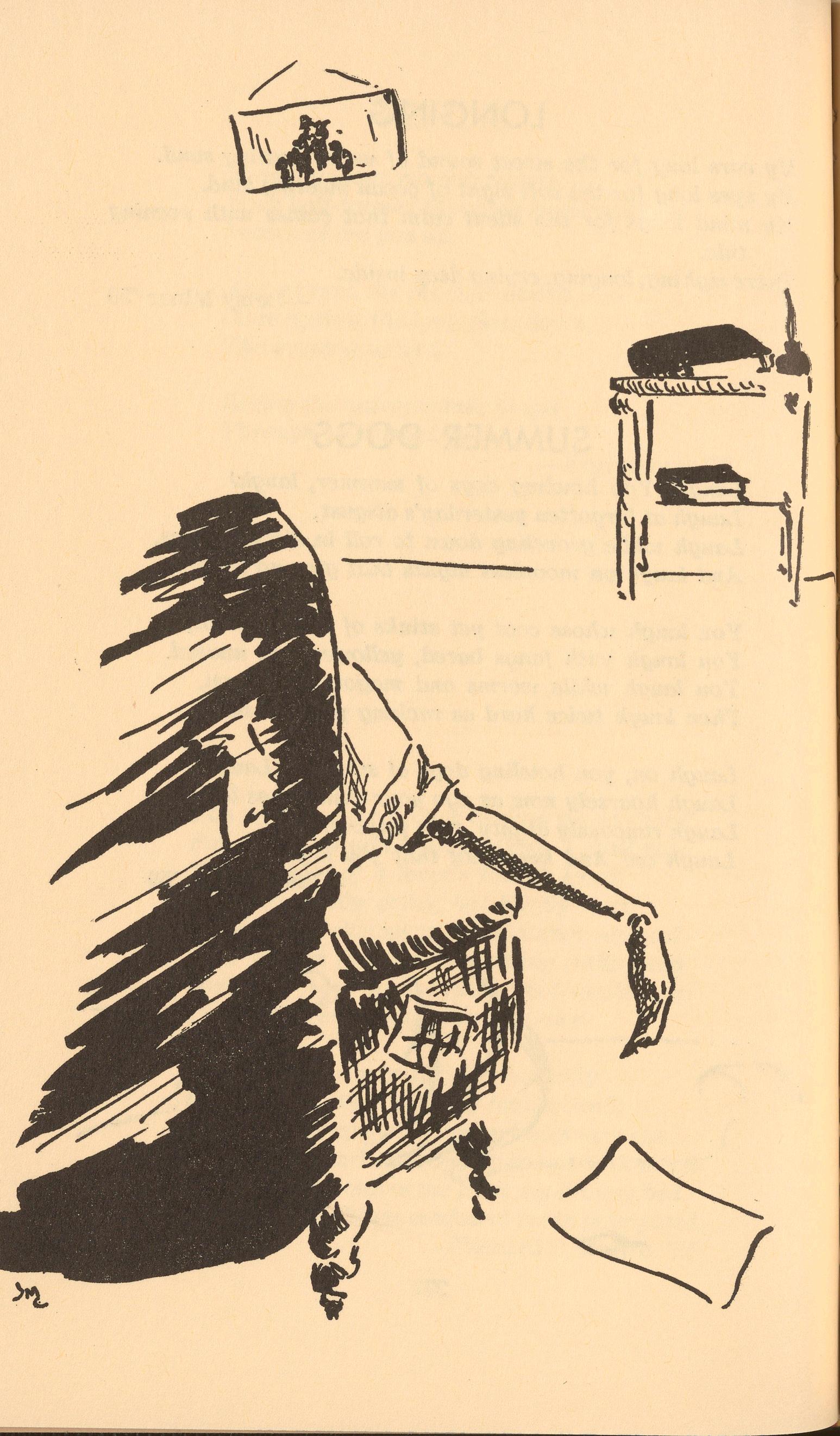
Quietly sobs the night
With the tender cri(38of birth, and you ...
Would you have it thus, to hide your tears
And ask a lover to wait . . . to be cold under an old blanket
Black and torn .••
In the early morning ... where I cannot come.
Do you think, you of the quiet love, do you think That I could s7,eeponce ... in the silence of a spent night ... Without memory'/
Outside my window
Like a tall Pandora~ the tracks of midnight, or two, or when (It cannot matter when)
Scream and shutter, and call ... I want to answer
There in the midst of all that is you--
Crying Ophelia to a dead stream, that is not deep, Not deep enough for me ... sometimes ... within me lt is to wonder Whether this was ever deep enough for you?
Who will be here, when you are gone
To knit hair-shirts and speak
Of lonely nights, and wonder whether this flight Is like tearing a veil
Or seeking beneath the notes of a melody
An old memory.
Who will be here, in the far-black night
When you are gone?

-Mary Elizabeth Hix '57
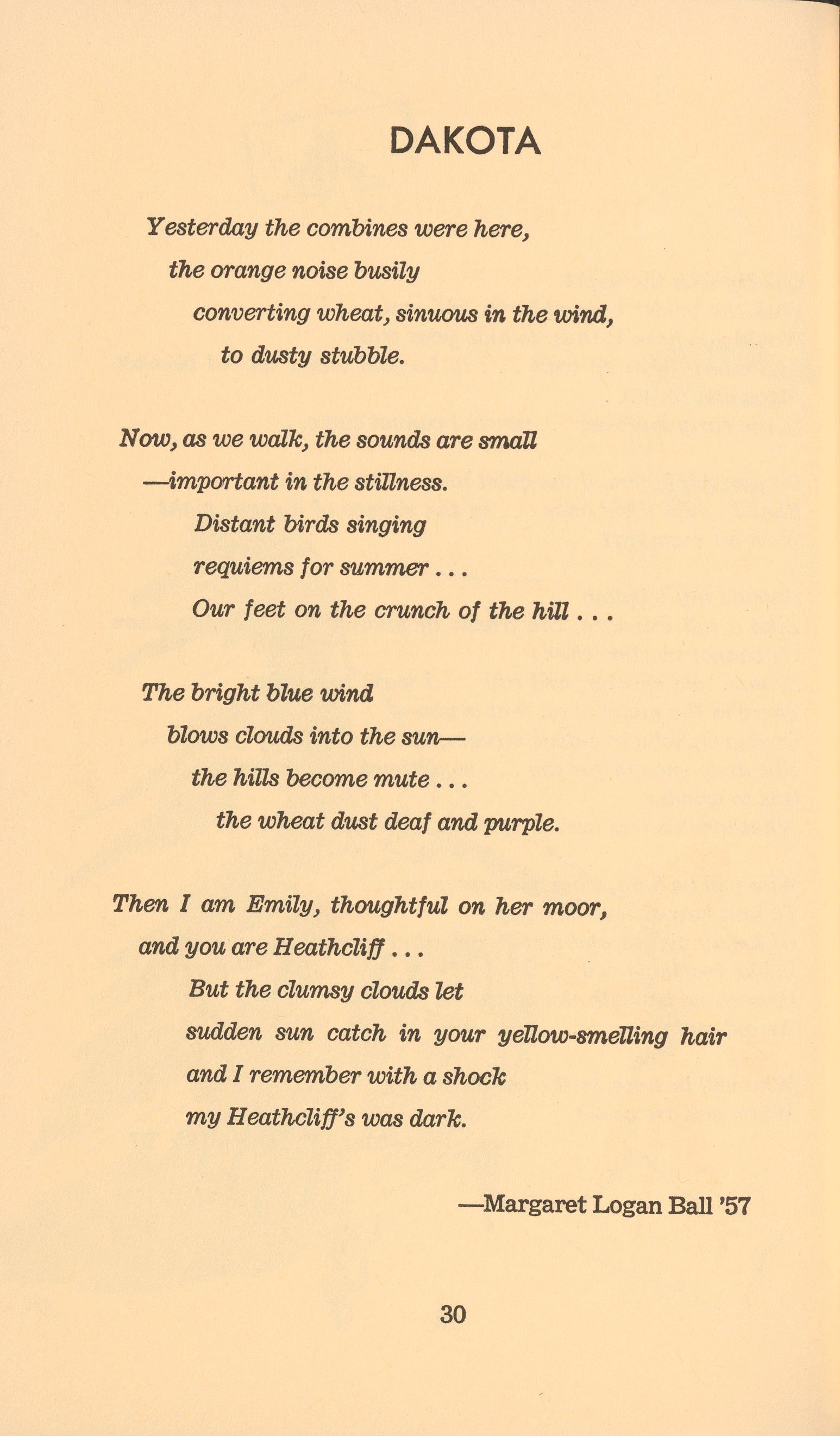
Yesterday the combines were here, the orange noise busily converting wheat, sinuous in the wind, to dusty stubble.
Now, as we walk, the sounds are small -imporrtant in the stillness.
Distant birds singing requiems for summer ...
Our feet on the crunch of the hill ..•
The bright blue wind blows clouds into the sunthe hills become mute •.• the wheat dust deaf and ']YUrple.
Then I am Emily, thoughtful on her moor, and you are H eathcliff ...
But the clumsy clouds let sudden sun catch in your yellow-smelling hair and I remember with a shock my Heathcliff's was dark.
-Margaret Logan Ball '57
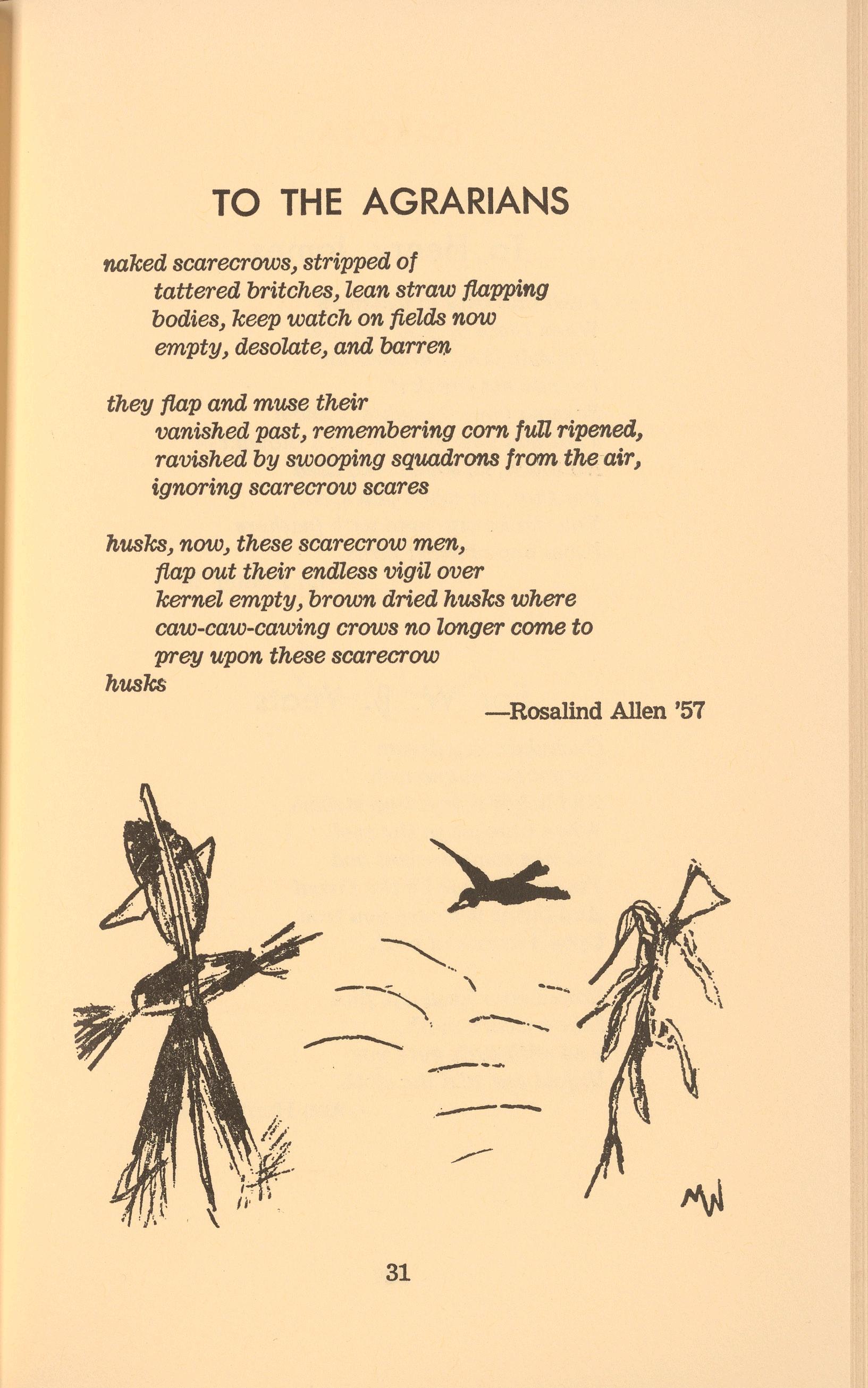
naked scarecrows, stripped of tattered britches, lean straw flapping bodies, keep watch on fields now empty, desolate, and barren they flap and muse their vanished past, remembering corn full ripened, ravished by swooping squadrons from the air, ignoring scarecrow scares husks, now, these scarecrow men, fiap out their endless vigil over kernel empty, brown dried husks where caw-caw-cawing crows no longer come to '/YT'e'Yupon these scarecrow husks

I will talk only in whispers When I talk of you: the web You spin is soft around meI would not break it. Sensing your thoughts, I know That you yourself are but a thoughtNo touch, no sound-no need For that, for when you speak You stroke my mind with feathers From non-existent birds.
-Ann Hunter '57
Cuchulain in a dream
Forgot the magic well And licked a dryed-up stream When time let go the spell: But like some ancient god You caught age by the throat And threw it where you trod Upon a worn-out coat.
Round your head age flies Like a weary moth, And with each gyre you Unfold and fold the cloth.
-Ann Hunter '57

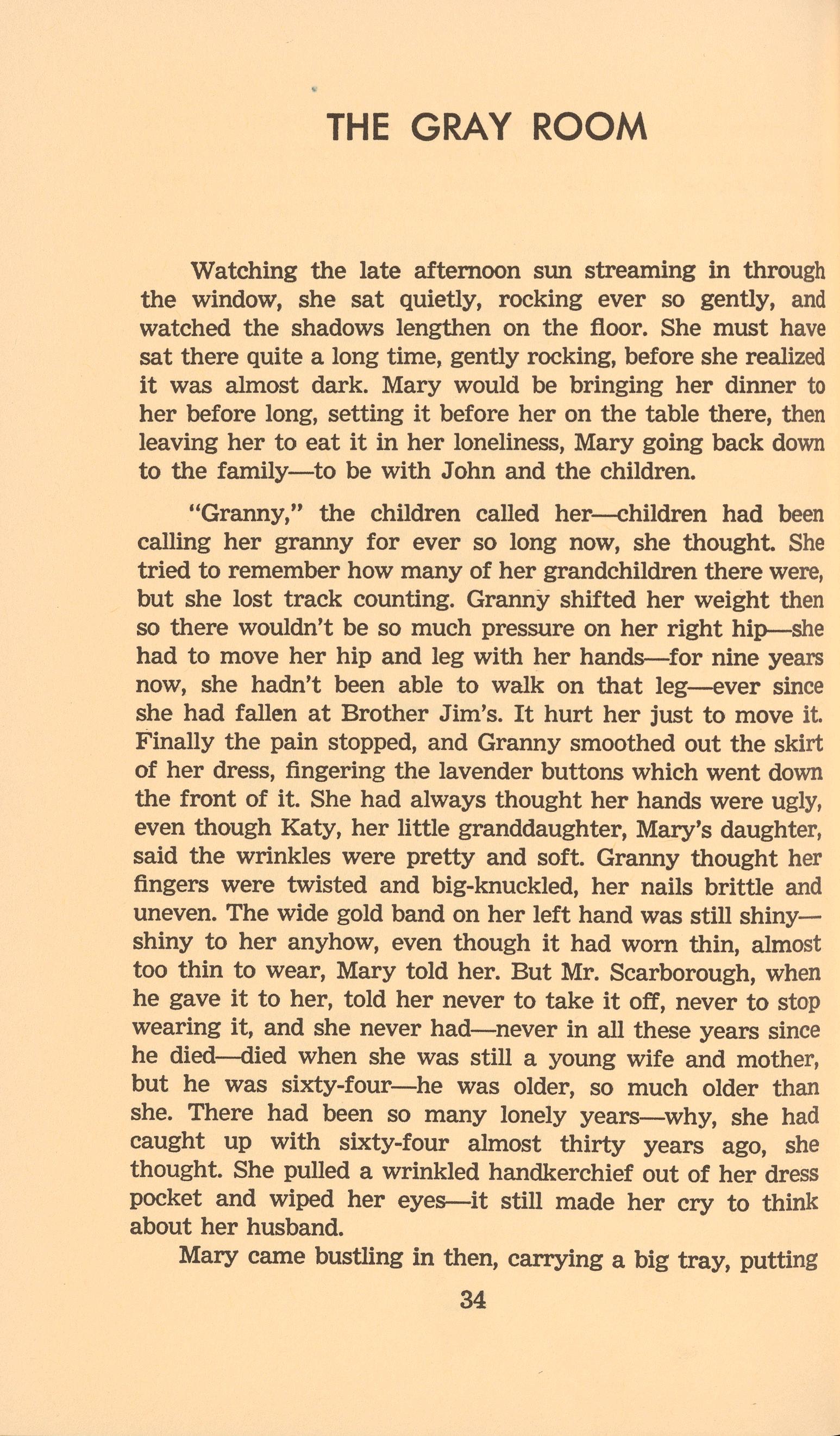
Watching the late afternoon sun streaming in through the window, she sat quietly, rocking ever so gently, and watched the shadows lengthen on the floor. She must have sat there quite a long time, gently rocking, before she realized it was almost dark. Mary would be bringing her dinner to her before long, setting it before her on the table there, then leaving her to eat it in her loneliness, Mary going back down to the family-to be with John and the children.
"Granny," the children called her-children had been calling her granny for ever so long now, she thought. She tried to remember how many of her grandchildren there were, but she lost track counting. Granny shifted her weight then so there wouldn't be so much pressure on her right hip-she had to move her hip and leg with her hands-for nine years now, she hadn't been able to walk on that leg-ever since she had fallen at Brother Jim's. It hurt her just to move it Finally the pain stopped, and Granny smoothed out the skirt of her dress, fingering the lavender buttons which went down the front of it. She had always thought her hands were ugly, even though Katy, her little granddaughter, Mary's daughter, said the wrinkles were pretty and soft. Granny thought her fingers were twisted and big-knuckled, her nails brittle and uneven. The wide gold band on her left hand was still shinyshiny to her anyhow, even though it had worn thin, almost too thin to wear, Mary told her. But Mr. Scarborough, when he gave it to her, told her never to take it off, never to stop wearing it, and she never had-never in all these years since he died-died when she was still a young wife and mother, but he was sixty-four-he was older, so much older than she. There had been so many lonely years-why, she had caught up with sixty-four almost thirty years ago, she thought. She pulled a wrinkled handkerchief out of her dress pocket and wiped her eyes-it still made her cry to think about her husband.
Mary came bustling in then, carrying a big tray, putting

Granny's supper out on the low round table, telling her to be sure and eat all of it, telling her just to ring her little bell if she wante<l anything else, then kissing her on the cheek, and going back out of the room, back downstairs with John and the children.
Granny ate slowly, trying to eat all of it, trying to do what Mary had said, but she couldn't finish-she thought Mary must cook broccoli every night now, when all she wanted was a little greens and cornbread. Mary told her that John and the children didn't like greens. Then Granny was through, and she waited for them to come up, John and Mary, and all three of the children-they came up every night after supper and stayed with her for a little while-John was so busy he always had to leave right away and do some work, and the children were always up to something. Still, Granny thought it was the nicest time of the day-when they all came in and sat down and talked to her.
Granny thought she heard them on the steps, and then John was in the room, walking over to her, kissing her, asking her if she had kept out of mischief all day-he always teased her, trying to make her feel good, Granny knew. Katy and Johnny and Bob were there too, now-Johnny jumping up in her wheel chair and riding all over the room, Katy coming over to hug her, Bob asking his dad for the car keys, telling her he had to go right now-he had a date in just a little while, and he didn't want to be late. Then Johnny jumped up and ran out of the room, downstairs, and outside to play with Billy and Linda next door. Katy stayed for a little while, but then she came over and kissed Granny goodnight, and went across to her room to do her lessons. But John and Mary were still there, still staying to talk to her. Granny thought Mary had done well to marry John-he had always been kind to his mother-in-law. He asked her about her day, if the medicine the doctor had prescribed was helping her pain, then he stood up to go, explaining as he always did that he had so much to do, giving her the magazines he had bought for her as he left-telling her she should go to bed soon anyway. Then Mary was standing up too-saying that she had to go back downstairs to wash the dishes, saying she would have to help Granny get to bed now. So John
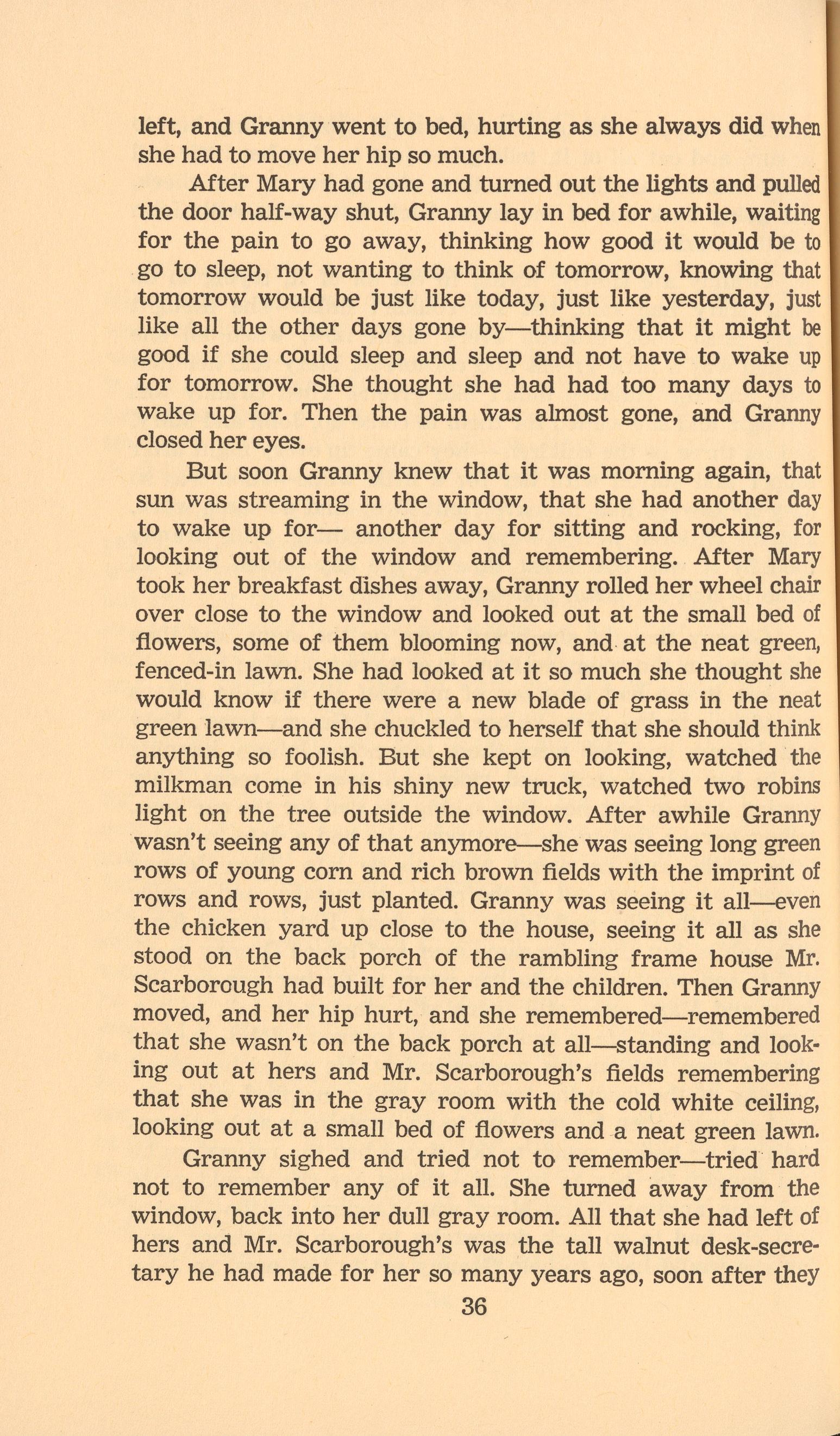
left, and Granny went to bed, hurting as she always did when she had to move her hip so much.
After Mary had gone and turned out the lights and pulled the door half-way shut, Granny lay in bed for awhile, waiting for the pain to go away, thinking how good it would be to go to sleep, not wanting to think of tomorrow, knowing that tomorrow would be just like today, just like yesterday, just like all the other days gone by-thinking that it might be good if she could sleep and sleep and not have to wake up for tomorrow. She thought she had had too many days to wake up for. Then the pain was almost gone, and Granny closed her eyes.
But soon Granny knew that it was morning again, that sun was streaming in the window, that she had another day to wake up for-another day for sitting and rocking, for looking out of the window and remembering. After Mary took her breakfast dishes away, Granny rolled her wheel chair over close to the window and looked out at the small bed of flowers, some of them blooming now, and at the neat green, fenced-in lawn. She had looked at it so much she thought she would know if there were a new blade of grass in the neat green lawn-and she chuckled to herself that she should think anything so foolish. But she kept on looking, watched the milkman come in his shiny new truck, watched two robins light on the tree outside the window. After awhile Granny wasn't seeing any of that anymore--she was seeing long green rows of young corn and rich brown fields with the imprint of rows and rows, just planted. Granny was seeing it all-even the chicken yard up close to the house, seeing it all as she stood on the back porch of the rambling frame house Mr. Scarborough had built for her and the children. Then Granny moved, and her hip hurt, and she remembered-remembered that she wasn't on the back porch at all-standing and looking out at hers and Mr. Scarborough's fields remembering that she was in the gray room with the cold white ceiling, looking out at a small bed of flowers and a neat green lawn. Granny sighed and tried not to remember-tried · hard not to remember any of it all. She turned away from the window, back into her dull gray room. All that she had left of hers and Mr. Scarborough's was the tall walnut desk-secretary he had made for her so many years ago, soon after they
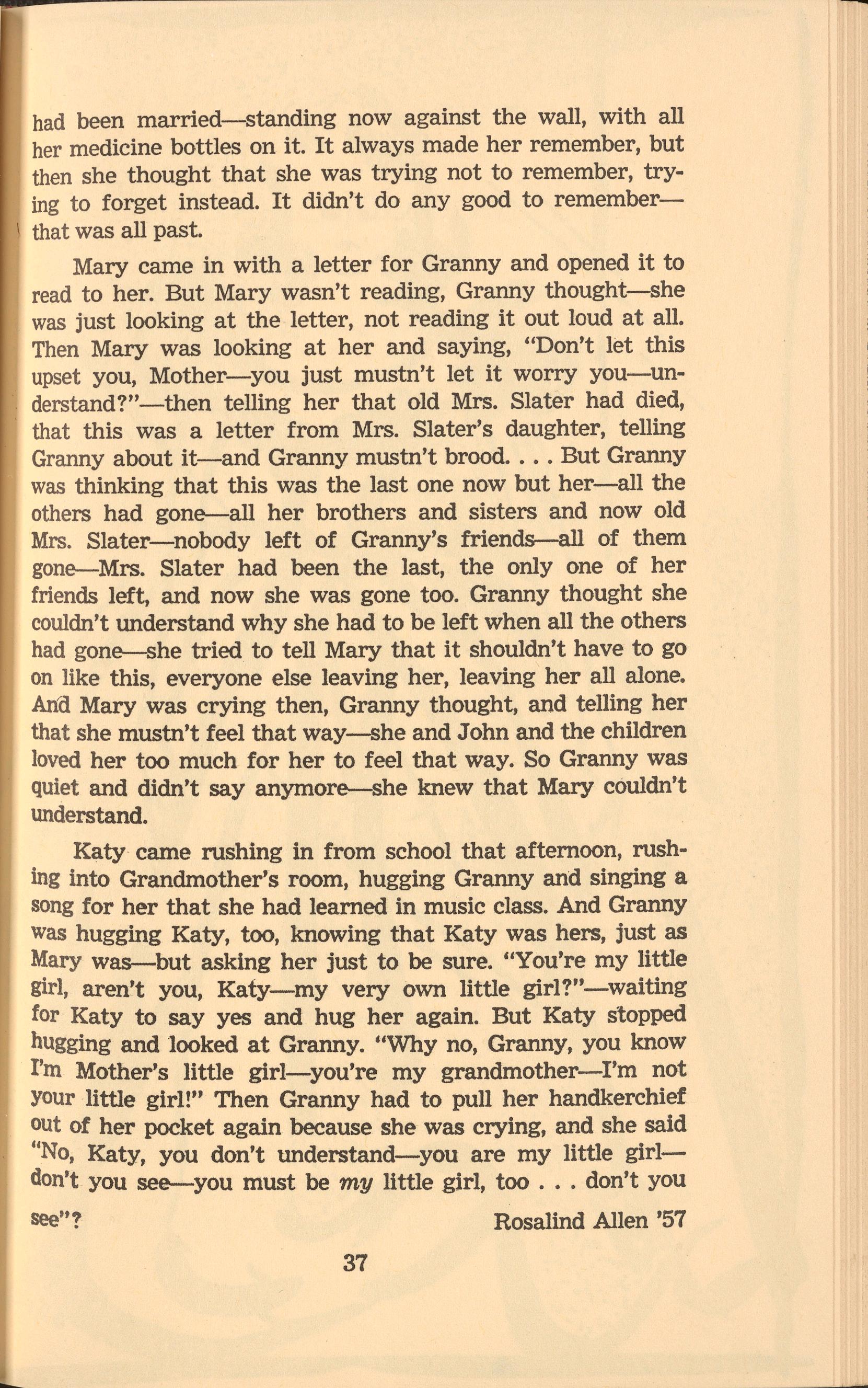
had been married-standing now against the wall, with all her medicine bottles on it. It always made her remember, but then she thought that she was trying not to remember, trying to forget instead. It didn't do any good to remember\ that was all past.
Mary came in with a letter for Granny and opened it to read to her. But Mary wasn't reading, Granny thought-she was just looking at the letter, not reading it out loud at all. Then Mary was looking at her and saying, "Don't let this upset you, Mother-you just mustn't let it worry you-understand ?"-then telling her that old Mrs. Slater had died, that this was a letter from Mrs. Slater's daughter, telling Granny about it-and Granny mustn't brood .... But Granny was thinking that this was the last one now but her-all the others had gone-all her brothers and sisters and now old Mrs. Slater-nobody left of Granny's friends-all of them gone-Mrs. Slater had been the last, the only one of her friends left, and now she was gone too. Granny thought she couldn't understand why she had to be left when all the others had gone-she tried to tell Mary that it shouldn't have to go on like this, everyone else leaving her, leaving her all alone. And Mary was crying then, Granny thought, and telling her that she mustn't feel that way-she and John and the children loved her too much for her to feel that way. So Granny was quiet and didn't say anymore-she knew that Mary couldn't understand.
Katy came rushing in from school that afternoon, rushing into Grandmother's room, hugging Granny and singing a song for her that she had learned in music class. And Granny was hugging Katy, too, knowing that Katy was hers, just as Mary was-but asking her just to be sure. "You're my little girl, aren't you, Katy-my very own little girl?"-waiting for Katy to say yes and hug her again. But Katy stopped hugging and looked at Granny. "Why no, Granny, you know I'm Mother's little girl-you're my grandmother-I'm not your little girl!" Then Granny had to pull her handkerchief out of her pocket again because she was crying, and she said "No, Katy, you don't understand-you are my little girldon't you see-you must be my little girl, too . . . don't you see"?
Rosalind Allen '57
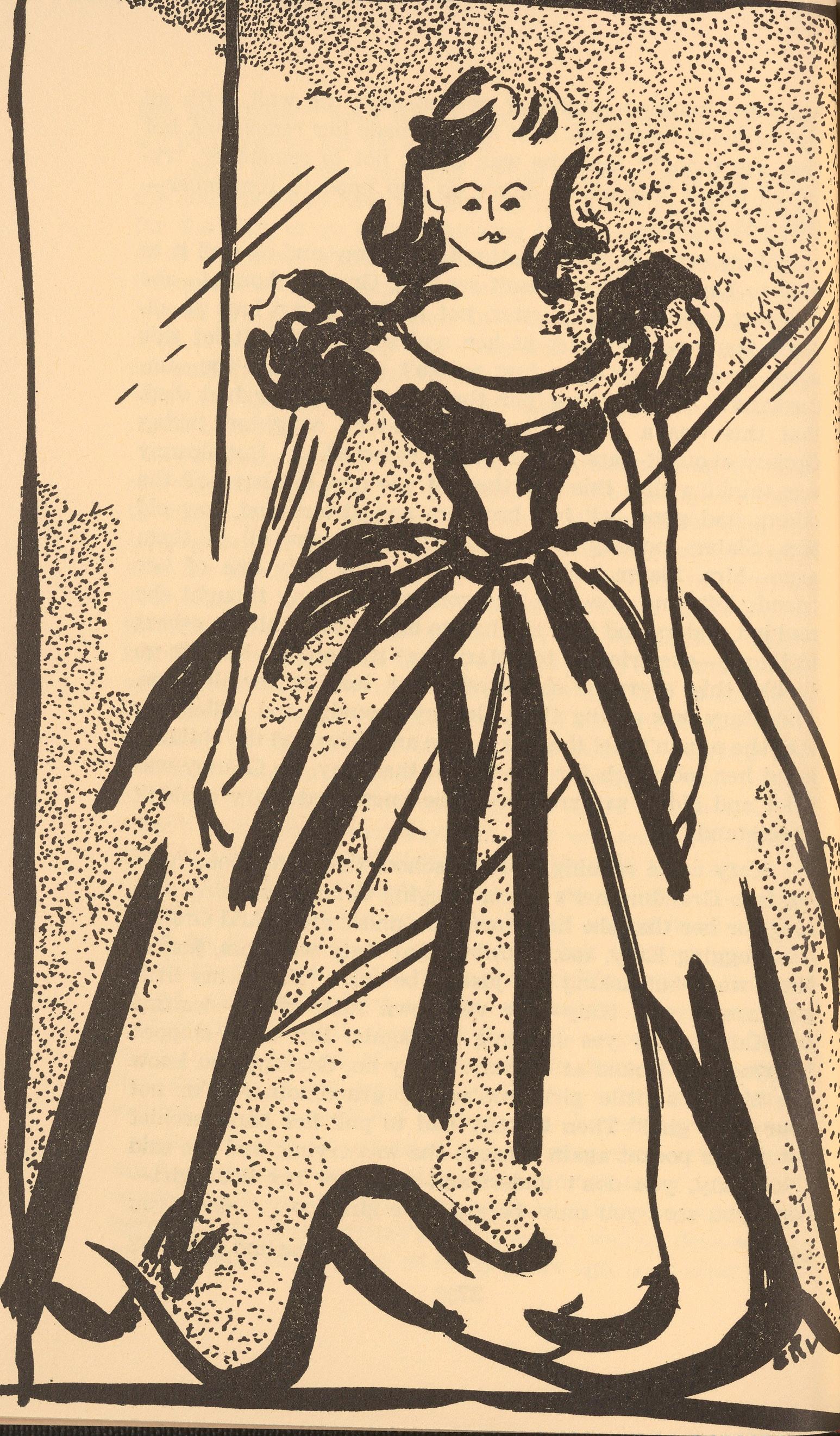
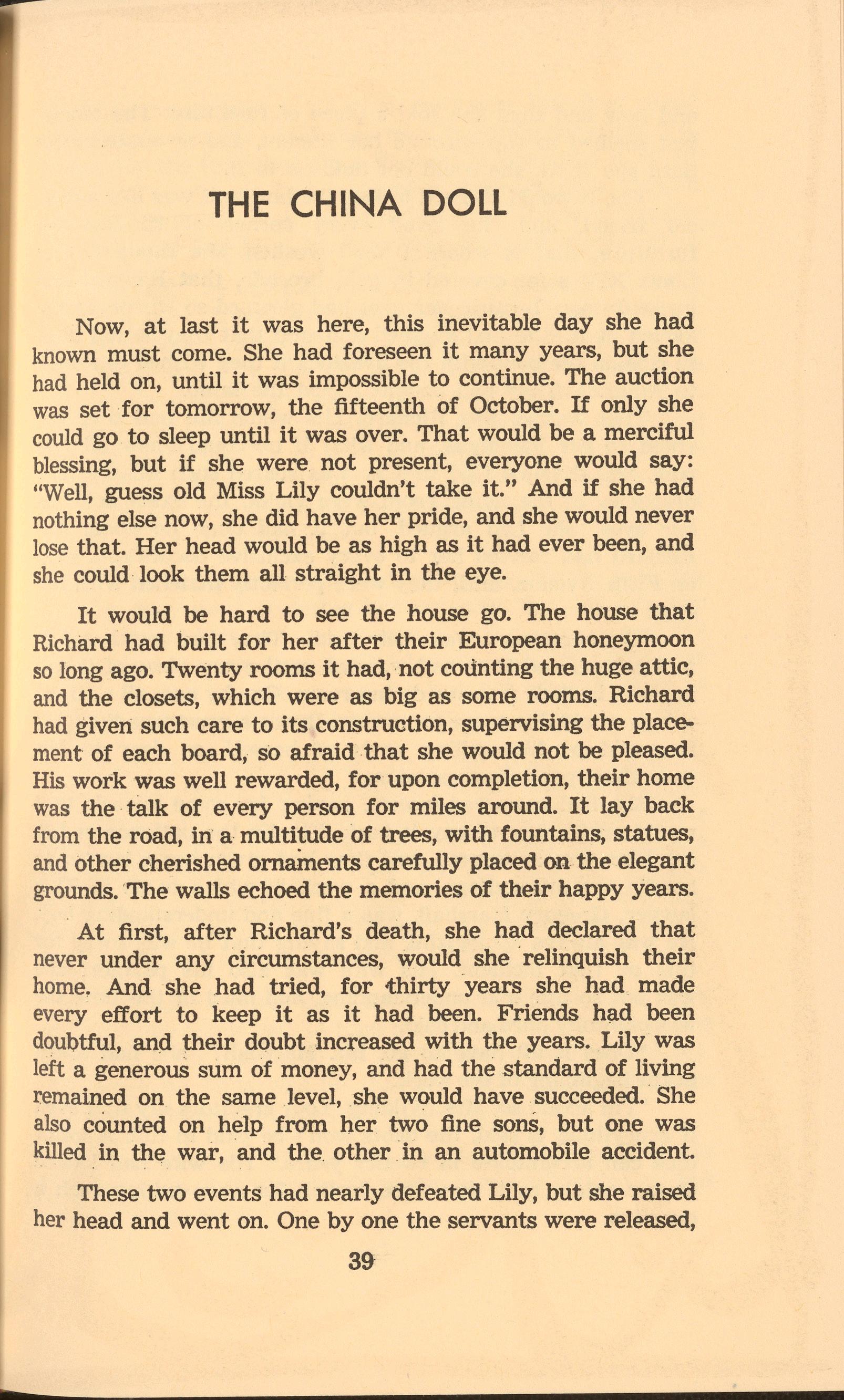
Now, at last it was here, this inevitable day she had known must come. She had foreseen it many years, but she had held on, until it was impossible to continue. The auction was set for tomorrow, the fifteenth of October. If only she could go to sleep until it was over. That would be a merciful blessing, but if she were not present, everyone would say: "Well, guess old Miss Lily couldn't take it." And if she had nothing else now, she did have her pride, and she would never lose that. Her head would be as high as it had ever been, and she could look them all straight in the eye.
It would be hard to see the house go. The house that Richard had built for her after their European honeymoon so long ago. Twenty rooms it had, not counting the huge attic, and the closets, which were as big as some rooms. Richard had given: such care to its construction, supervising the placement of each board, so afraid that she would not be pleased. His work was well rewarded, for upon completion, their home was the ·talk of every person for miles around. It lay back from the road, in' a multitude of trees, with fountains, statues, and other cherished ornaments carefully placed on the elegant grounds. 'The walls echoed the memories of their happy years.
At first, after Richard's death, she had declared that never under any circumstances, would she ·relinquish their home. And she had ·tried, for thirty ·years she had made every effort to keep it as it had been. Friends had been doubtful, and their doubt increased with the years. Lily was left a generous sum of money, and had the standard of living remained on the same level, she would have succeeded. She also counted on help from her two fine sons, but one was killed in the war, and the . other .·in an automobile accident.
These two events had nearly defeated Lily, but she raised her head and went on. One by one the servants were released,
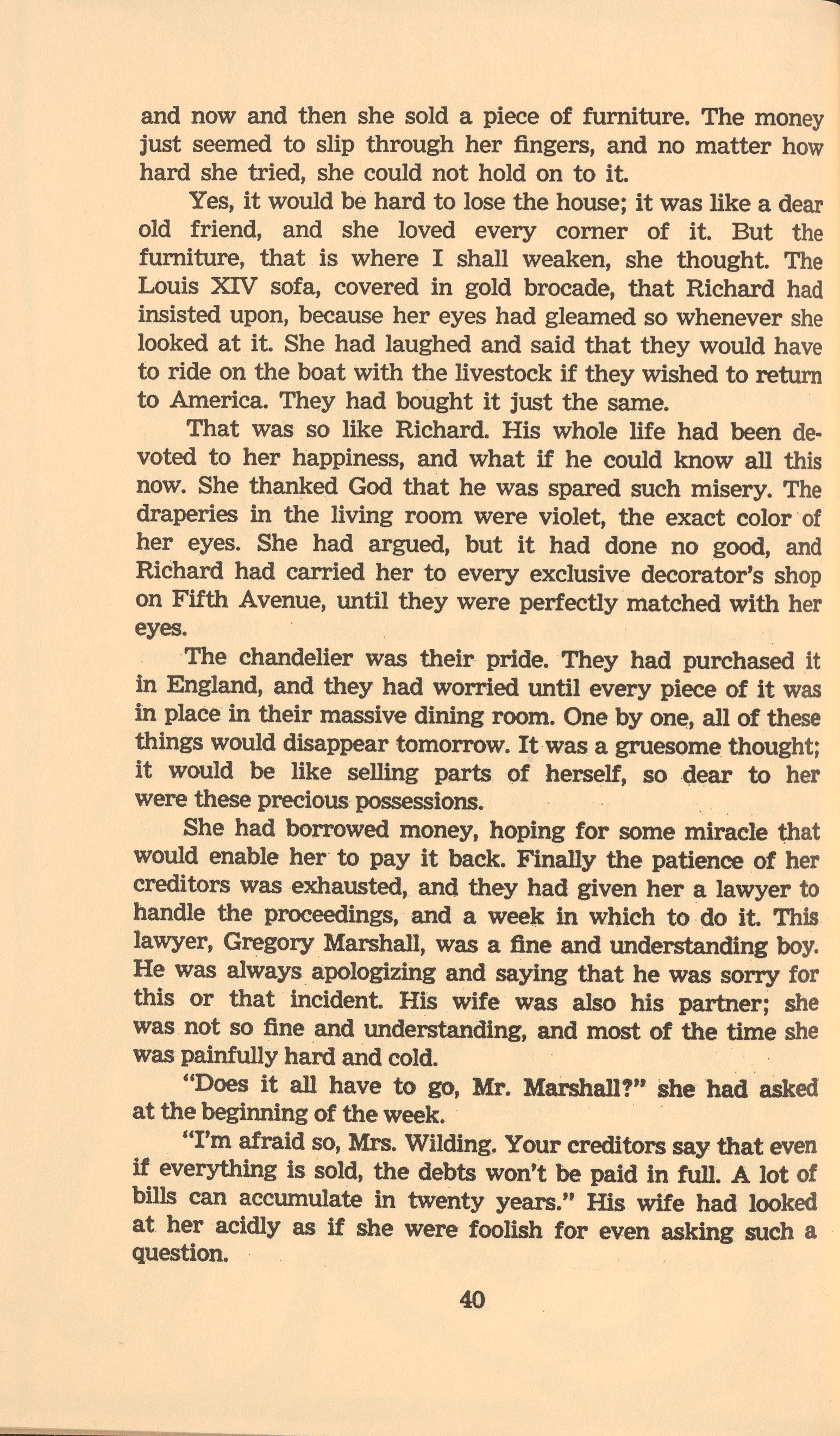
and now and then she sold a piece of furniture. The money just seemed to slip through her fingers, and no matter how hard she tried, she could not hold on to it.
Yes, it would be hard to lose the house; it was like a dear old friend, and she loved every corner of it. But the furniture, that is where I shall weaken, she thought. The Louis XIV sofa, covered in gold brocade, that Richard had insisted upon, because her eyes had gleamed so whenever she looked at it. She had laughed and said that they would have to ride on the boat with the livestock if they wished to return to America. They had bought it just the same.
That was so like Richard. His whole life had been devoted to her happiness, and what if he could know all this now. She thanked God that he was spared such misery. The draperies in the living room were violet, the exact color ·of her eyes. She had argued, but it had done no good, and Richard had carried her to every exclusive decorator's shop on Fifth Avenue, until they were perfectly matched with her eyes.
The chandelier was their pride. They had purchased it in England, and they had worried until every piece of it was in place in their massive dining room. One by one, all of these things would disappear tomorrow. !twas a gruesome thought; it would be like selling parts of herself, so dear to her were these precious possessions.
She had borrowed money, hoping for some miracle that would enable her to pay it back. Finally the patience of her creditors was exhausted, and they had given her a lawyer to handle the proceedings, and a weelt in which to do it. This lawyer, Gregory Marshall, was a fine and understanding boy. He was always . apologizing and saying that he was sorry for this or that incident. His wife was also his partner; she was not so fine and understanding, and most of the time she was painfully hard and cold.
"Does it all have to go, Mr. Marshall?" she had asked at the beginning of the week.
"I'm afraid so, Mrs. Wilding. Your creditors say that even if everything is sold, the debts won't be paid in full. A lot of bills can accumulate in twenty years." His wife had looked at her acidly as if she were foolish for even asking such a question.
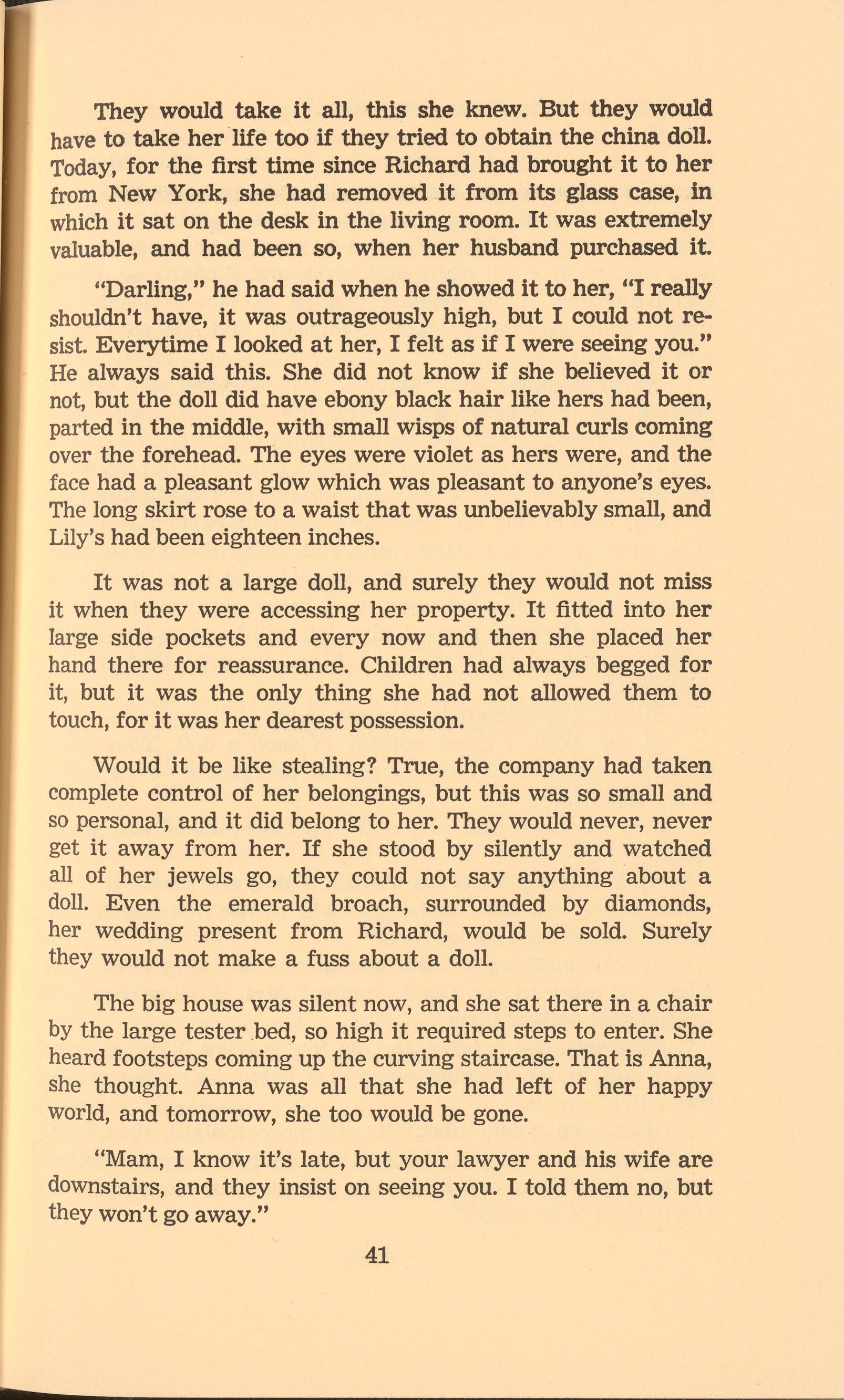
They would take it all, this she knew. But they would have to take her life too if they tried to obtain the china doll. Today, for the first time since Richard had brought it to her from New York, she had removed it from its glass case, in which it sat on the desk in the living room. It was extremely valuable, and had been so, when her husband purchased it.
"Darling," he had said when he showed it to her, "I really shouldn't have, it was outrageously high, but I could not resist. Everytime I looked at her, I felt as if I were seeing you." He always said this. She did not know if she believed it or not, but the doll did have ebony black hair like hers had been, parted in the middle, with small wisps of natural curls coming over the forehead. The eyes were violet as hers were, and the face had a pleasant glow which was pleasant to anyone's eyes. The long skirt rose to a waist that was unbelievably small, and Lily's had been eighteen inches.
It was not a large doll, and surely they would not miss it when they were accessing her property. It fitted into her large side pockets and every now and then she placed her hand there for reassurance. Children had always begged for it, but it was the only thing she had not allowed them to touch, for it was her dearest possession.
Would it be like stealing? True, the company had taken complete control of her belongings, but this was so small and so personal, and it did belong to her. They would never, never get it away from her. If she stood by silently and watched all of her jewels go, they could not say anything about a doll. Even the emerald broach, surrounded by diamonds, her wedding present from Richard, would be sold. Surely they would not make a fuss about a doll.
The big house was silent now, and she sat there in a chair by the large tester bed, so high it required steps to enter. She heard footsteps coming up the curving staircase. That is Anna, she thought. Anna was all that she had left of her happy world, and tomorrow, she too would be gone.
"Mam, I know it's late, but your lawyer and his wife are downstairs, and they insist on seeing you. I told them no, but they won't go away."

·"It is a.IIrightt Anna; I'm coming."
Slowly she rose, each movement reflecting the grief in her heart. She carefully descended the steps, "We old folks must be careful," she smiled to herself, and thoughts ran through her mind of other nights when she had come down these very steps on Richard's arm to greet their many guests. She, radiant in a full white ball gown, and Richard, so proud and handsome in his evening clothes. As she remembered these things her face became composed, and she was rigid and alert.
"Good evening, Mrs. Wilding." Mr. Marshall said as she entered. He was nervously pacing the floor. His wife was seated in a fragile antique chair, deep in thought.
"I'm sorry to bother you at such a late hour, but my wife has placed me in a very embarassing and awkward situation. She says that during the week here, she took particular notice of a china doll in the living room. But, today there is no such doll. She feels that it is being withheld, and if so, its disap- pearance will be blamed upon us. I know nothing of such a matter, but if she is correct, the doll will have to be placed with the rest of your things. I hope sincerely that she is mistaken."
Stiffly, Lily straightened in her chair.
"I see. Well, I know nothing of such a doll. Your wife must be mistaken. I have turned in everything-even most of my clothes."
Mrs. Marshall rose and said in a high-pitched and stern voice.
"She is lying. I am not mistaken, and she knows it. The whole house will have to be searched in the morning if she doesn't give it back before then."
"I know nothing of what you speak. I am very tired, and I have no more to say. Good evening." Mrs. Wilding rose and walked past both of them.
"Gregory, she is lying, the old fool is lying. I know there was a doll, and a valuable one, and if it is missing her credi• tors will blame us."
"Let's not worry about it any more tonight, dear," he said impatiently. "Even if there is a doll, it seems senseless not to let her keep one thing. We will see about it tomorrow. It will have to be found." ·

The day of the auction rose clear and cold. The lawyer and his wife entered the great house, and there was a man with them.
·'
"Good morning, Anna," said Mrs. Marshall. "This is Mr. Barnes. He is from the detective agency, and he is here to help us get to the bottom of the matter I was discussing with · you Y,esterday. Where is your mistress?"
. "She is not yet up, maam ... if ... "
That is quite all right. We won't wait. Maybe if we take her by surprise we will find what we are looking for."
They went up the stairs and knocked on the thick, wooden door. There was no answer. Anna tried to protest as Mrs. Marshall opened the door and went in.
"She didn't even go to bed. There she is sitting in her chair, and look! There is the doll, just as I told you."
Gregory Marshall crossed the room.
"She is indeed asleep, my dear."
He took the doll and placed it between her arms, on her br east.
"I am glad," he said, "that she did not have to go through tomorrow and see her whole life go to pieces before her eyes."
The agent attempted to take the doll, but he was stopped by Gregory. "God was merciful to her in this way."
"Leave them both alone. We have done enough to her. This doll will stay with her as long as possible, and no one, including you, my dear, will pry it away."
They walked out of the room, away from the old lady who had asked for so little in her last moments. This woman who had died not from any common ailment of old age, but from a broken heart.
Down the steps they went, to the tune of the auctioneer'~ voice:
"All right ladies and gentlemen. Just what am I bid for this gen-u-ine imported french sofa? Twenty-five dollars! Come, come now. Fifty dollars? Now there's a lady that knows her furniture!"
-Betty Stembridge Leggett
Editorial note: Betty Stembridge Leggett is a Westhampton graduate, '55, returning this semester as a special student.
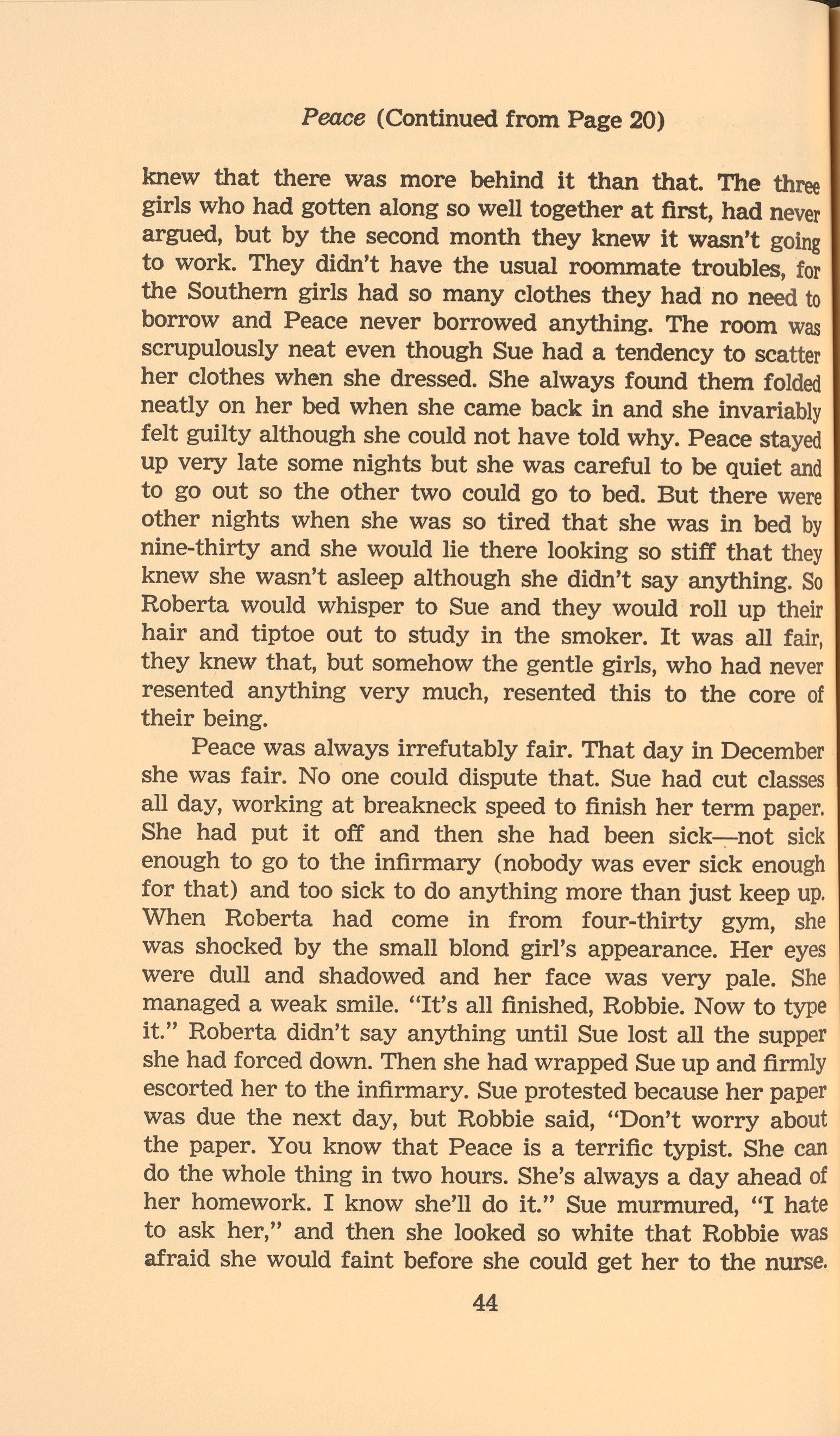
(Continued from Page 20)
knew that there was more behind it than that. The three girls who had gotten along so well together at first, had never argued, but by the second month they knew it wasn't going to work. They didn't have the usual roommate troubles, for the Southern girls had so many clothes they had no need to borrow and Peace never borrowed anything. The room was scrupulously neat even though Sue had a tendency to scatter her clothes when she dressed. She always found them folded neatly on her bed when she came back in and she invariably felt guilty although she could not have told why. Peace stayed up very late some nights but she was careful to be quiet and to go out so the other two could go to bed. But there were other nights when she was so tired that she was in bed by nine-thirty and she would lie there looking so stiff that they knew she wasn't asleep although she didn't say anything. So Roberta would whisper to Sue and they would roll up their hair and tiptoe out to study in the smoker. It was all fair, they knew that, but somehow the gentle girls, who had never resented anything very much, resented this to the core of their being.
Peace was always irrefutably fair. That day in December she was fair. No one could dispute that. Sue had cut classes all day, working at breakneck speed to finish her term paper. She had put it off and then she had been sick-not sick enough to go to the infirmary (nobody was ever sick enough for that) and too sick to do anything more than just keep up. When Roberta had come in from four-thirty gym, she was shocked by the small blond girl's appearance. Her eyes were dull and shadowed and her face was very pale. She managed a weak smile. "It's all finished, Robbie. Now to type it." Roberta didn't say anything until Sue lost all the supper she had forced down. Then she had wrapped Sue up and firmly escorted her to the infirmary. Sue protested because her paper was due the next day, but Robbie said, "Don't worry about the paper. You know that Peace is a terrific typist. She can do the whole thing in two hours. She's always a day ahead of her homework. I know she'll do it." Sue murmured, "I hate to ask her," and then she looked so white that Robbie was afraid she would faint before she could get her to the nurse.
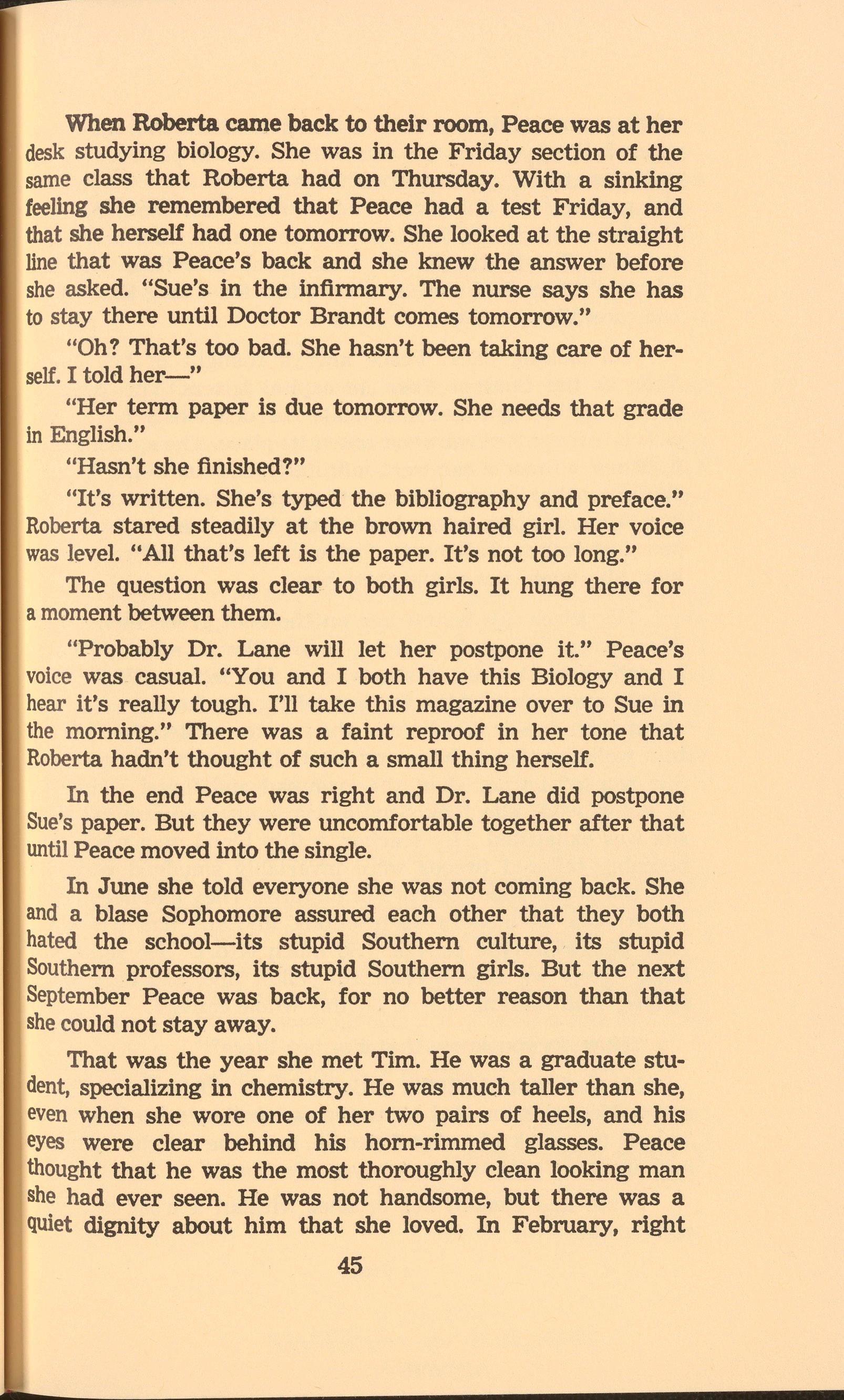
When Robertacame back to their room, Peace was at her desk studying biology. She was in the Friday section of the same class that Roberta had on Thursday. With a sinking feeling she remembered that Peace had a test Friday, and that she herself had one tomorrow. She looked at the straight line that was Peace's back and she knew the answer before she asked. "Sue's in the infirmary. The nurse says she has to stay there until Doctor Brandt comes tomorrow."
"Oh? That's too bad. She hasn't been taking care of herself.I told her-"
"Her term paper is due tomorrow. She needs that grade in English."
"Hasn't she finished?"
"It's written. She's typed the bibliography and preface." Roberta stared steadily at the brown haired girl. Her voice was level. "AU that's left is the paper. It's not too long."
The question was clear to both girls. It hung there for a moment between them.
"Probably Dr. Lane will let her postpone it." Peace's voice was casual. "You and I both have this Biology and I hear it's really tough. I'll take this magazine over to Sue in the morning." There was a faint reproof in her tone that Roberta hadn't thought of such a small thing herself.
In the end Peace was right and Dr. Lane did postpone Sue's paper. But they were uncomfortable together after that untilPeace moved into the single.
In June she told everyone she was not coming back. She and a blase Sophomore assured each other that they both hated the school-its stupid Southern culture, its stupid Southern professors, its stupid Southern girls. But the next September Peace was back, for no better reason than that shecould not stay away.
That was the year she met Tim. He was a graduate student, specializing in chemistry. He was much taller than she, even when she wore one of her two pairs of heels, and his eyes were clear behind his horn-rimmed glasses. Peace thought that he was the most thoroughly clean looking man she had ever seen. He was not handsome, but there was a Quietdignity about him that she loved. In February, right
after exams .and the end of ' the first semester, - they ',were pinned. Peace waited for a month, wore the pin even on her pajamas, trying the reality she had previously known with the present, and then wrote her mother. Her mother's reply had been courteous, kind, a stranger's n:ote. She had ended it with, "I told Henry. He sends congratulations and best wishes." Peace had stared at the letter for a long time before she carefully tore it to bits . .
On looking back, Peace always thought of her Junior Year as the Content Year, in capital letters. The youth of loving and being loved had made her deliriously happy, but now a soft contentment had taken its place. The spring nights in Tim's old model car were infinitely precious to her because she knew that she would have to spend the next year without him. He was going to a school in .the West, one she had never heard of before. Talking to Tim .was as sweet to Peace as his kiss. She knew she would miss him.
His letter lay before her on the cool green metal desk They wrote every day. Peace didn't like to admit, even to herself, how dependent she was on his letters. When they didn't come, she couldn't forbear telling the Juniors next door about their too-loud radio and she was tormented through the thin walls by their whispering .after they came in from dates, She worked harder than she ever had and found a fine joy in doing well. She took Studio Art again and painted until she was exhausted. Her teacher, a thin blond man whose im· peccably tailored tweeds were invariably smudged with the oils; asked her about one of her pictures. They had been doing an exercise in modern abstractions, and she bad ·painted a neat Mondrian-type canvas. "So much effort." He shook his head. "Here we have a beautiful yellow line, and here a red square. And nothing of yciu on this whole canvas."
"How do you know that I'm not there?" . '' ·-
He had stared at the ordered lines. "If you are, I am sorry. Mondrian created his canvasses so they were beautiful; This is the work of a caged person, someone caught by order and afraid of expression. Are you like that?!'
Peace had cleared her brushes without a word and had-' stalked out. · ·
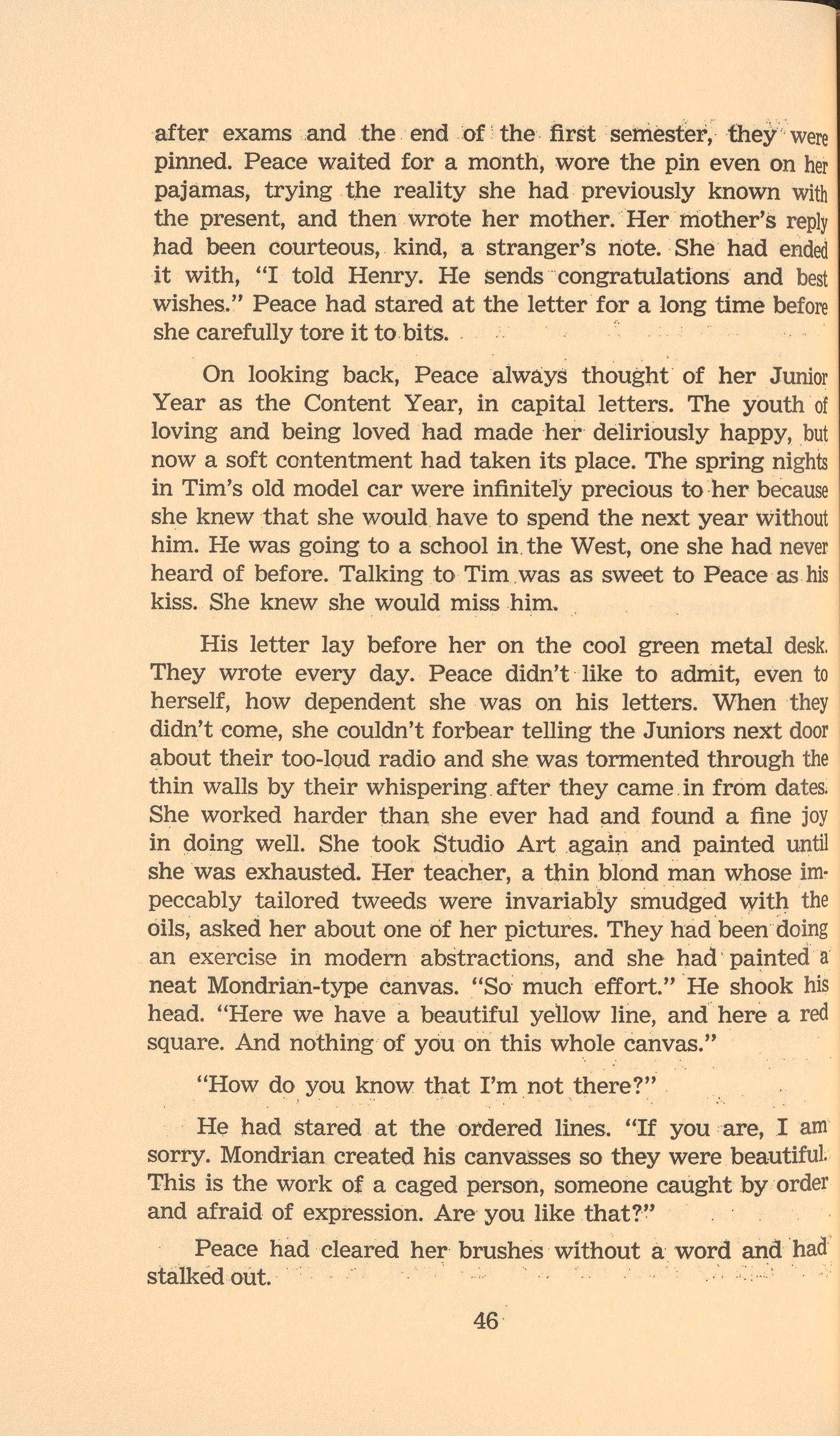
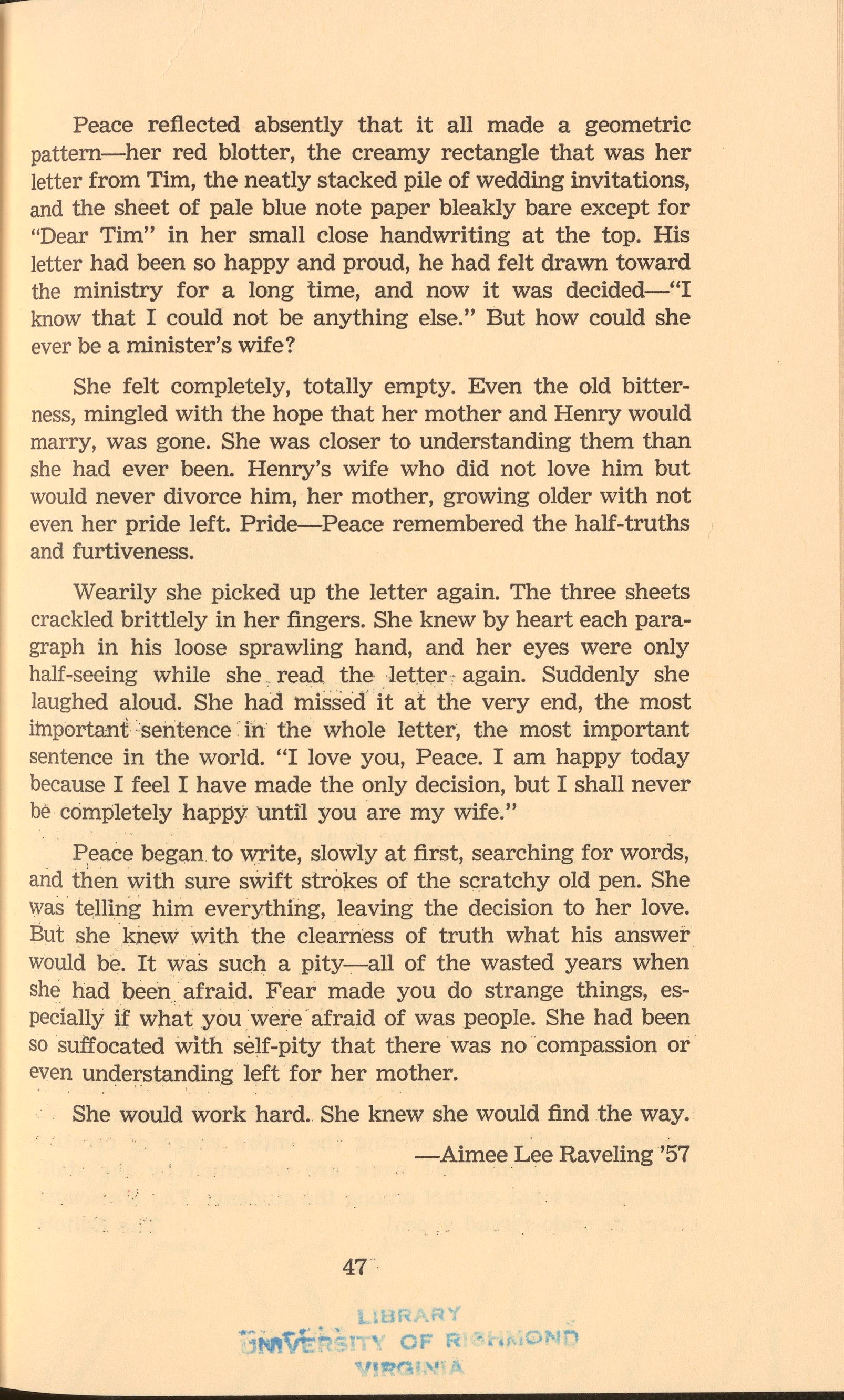
Peace reflected absently that it all made a geometric pattern-her red blotter, the creamy rectangle that was her letter from Tim, the neatly stacked pile of wedding invitations, and the sheet of pale blue note paper bleakly bare except for "Dear Tim" in her small close handwriting at the top. His letter had been so happy and proud, he had felt drawn toward the ministry for a long time, and now it was decided-"! know that I could not be anything else." But how could she ever be a minister's wife?
She felt completely, totally empty. Even the old bitterness, mingled with the hope that her mother and Henry would marry, was gone. She was closer to understanding them than she had ever been. Henry's wife who did not love him but would never divorce him, her mother, growing older with not even her pride left. Pride-Peace remembered the half-truths and furtiveness.
Wearily she picked up the letter again. The three sheets crackled brittlely in her fingers. She knew by heart each paragraph in his loose sprawling hand, and her eyes were only half-seeing while she , rea,d the Jetter , again. Suddenly she laughed aloud. She had missed ' it at the very end, the most important sentence : in the whole letter; the most important sentence in the world. "I love you, Peace. I am happy today because I feel I have made the only decision, but I shall never be completely happy until you are my wife."
~eace began to write, slowly at first, searching for words, arid then with sure swift strokes of the scratchy old pen. She was temng him everything, leaving the decision to her love. But she knew :with the clearness of truth what his answer would be. It was such a pity-all of the wasted years when she had beenafraid. Fear made you do strange things, especially if what you were .afraid of was people. She had been so suffocated with self-pity that there was no compassion or even understanding left for her mother. '
She would work hard. She knew she would find the way.
-Aimee Lee Raveling '57
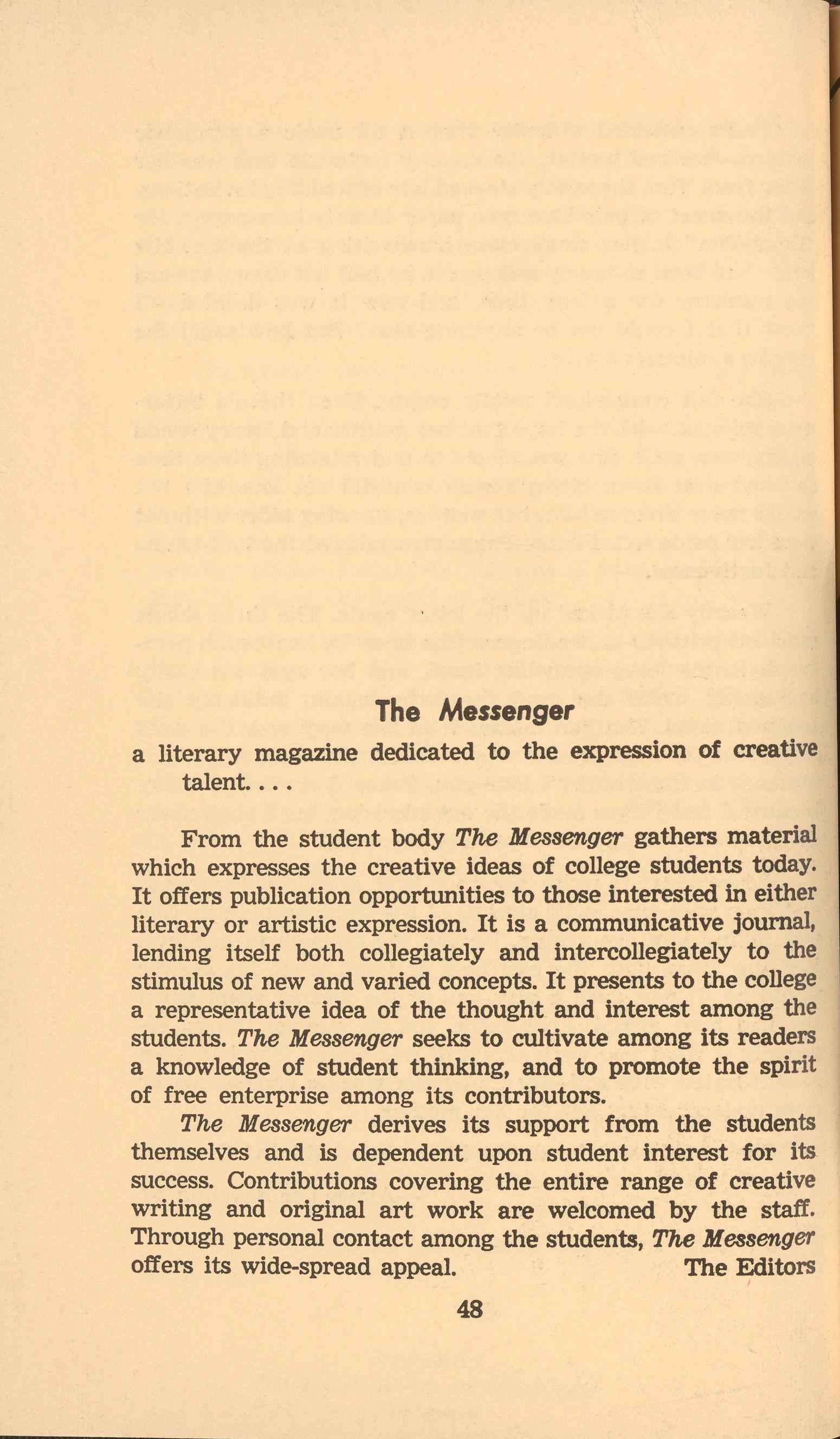
The Messenger a literary magazine dedicated to the expression of creative talent ....
From the student body The Messenger gathers material which expresses the creative ideas of college students today. It offers publication opportunities to those interested in either literary or artistic expression. It is a communicative journal, lending itself both collegiately and intercollegiately to the stimulus of new and varied concepts. It presents to the college a representative idea of the thought and interest among the students. The Messenger seeks to cultivate among its readers a knowledge of student thinking, and to promote the spirit of free enterprise among its contributors. The Messenger derives its support from the students themselves and is dependent upon student interest for its success. Contributions covering the entire range of creative writing and original art work are welcomed by the staff. Through personal contact among the students, The Messenger offers its wide-spread appeal. The Editors